School for Advanced Legal Studies
- Comparative Business Law in Africa
- Criminology, Law and Society
- Dispute Resolution
- Human Rights Law
- Marine & Environmental Law / Environmental Law
- Shipping Law
- Master's Mondays
- Postgraduate Specialisations
- Professional Masters
- Undertaking an MPhil in the Law Faculty
- Exchange Programme - UCT LLM
- Doctoral Degrees
- Law Faculty Handbook
- Choosing Courses
- Course Highlights
- Concessions
- Avoiding Plagiarism
- Dissertations & Theses

Topics & Supervisors
- Research Ethics
- Submission & Examination
- Research Supervision
- Research Examination
- Application & Admission
- Application & Admissions - Key Dates
- Required Application Documents
- Postgraduate Funding
- International Postgraduate Students
- English Proficiency
- Registration - Coursework Programmes
- Registration - Research Degrees
- PG Law Students Council
- Privacy for Students
- Meet & Greet
- Not in the Classroom
Choosing Your Topic
When choosing your topic keep the following important key considerations in mind:
- Does the substantive area you wish to research relate to the content covered in one/more of your courses and your chosen specialisation (if relevant)?
- Is the proposed area of research contemporary and novel?
- Is there sufficient and relevant academic resources on which you can draw to found your analysis?
- Is the scope and ambit of you proposed topic viable within the allotted word count - 25 000 words in the case of LLM/MPhil students doing a mini-dissertation along with coursework.
Choosing your Supervisor
Students are encouraged to approach a member of staff or programme convenor and propose an outline for their minor dissertation. The proposal should ideally contain the following aspects: the title; an abstract (of 400 words); the main research question and sub-questions to be addressed in the dissertation; the structure of the dissertation (with a brief description of the type of content to be included under each heading and subheading); and a provisional reading list. If the proposal is acceptable to the prospective supervisor, the student must arrange with that member of the Faculty staff to act as their supervisor.
When choosing a prospective supervisor keep the following important considerations in mind:
- Is the prospective supervisor academically competent in your anticipated area of research?
- Do you feel that the prospective supervisor will represent your interests and meet your expectations?
- Do you feel freely able to communicate with your prospective supervisor?
Registering your Topic and Supervisor
The formal appointment of your supervisor and registration of your topic is done by way of completing a Memorandum of Understanding and lodging it with the SALS Administrator (Law Faculty Office, Rm 4.48, Kramer Law Building). This Memorandum of Understanding should set out: the respective responsibilities and expectations of both supervisor and student; and the deadline for submission of the dissertation/or parts of it for comment and examination. An example of such a Memorandum, which must be signed by both you and your prospective supervisor, is attached to the Guidelines For Minor Dissertation/Research Papers. This process must be completed at the point of registration. Any subsequent change of supervisor must be similarly registered. The list of supervisors available for 2022, along with their areas of specialisation is below:

Family Laws and Regulations South Africa 2024
ICLG - Family Laws and Regulations - South Africa Chapter covers common issues in family law – including: jurisdiction, divorce, cohabitation, children, abduction, relocations, cross-border issues, parental responsibility, child maintenance and marital agreements.
Chapter Content Free Access
2. finances on divorce, 3. marital agreements, 4. cohabitation and the unmarried family, 5. child maintenance, 6. children – parental responsibility and custody, 7. children – international aspects, 8. overview.
1.1 What are the grounds of jurisdiction for divorce proceedings? For example, residence, nationality, domicile, etc.?
S2(1) of the Divorce Act, 70 of 1979 (‘DA’) provides that a court will have jurisdiction if one or both of the parties are domiciled within the court’s area of jurisdiction or one or both of the parties are ordinarily resident in the court’s area of jurisdiction and has been ordinarily resident in South Africa (‘SA’) for at least one year prior to that date.
1.2 What are the grounds for a divorce? For example, is there a required period of separation; can the parties have an uncontested divorce?
SA has a no-fault approach.
Grounds for divorce are (ss 4 and 5 DA) include: an irretrievable breakdown of the marriage with no reasonable prospect of restoring the relationship; mental illness without a reasonable prospect of a cure; unconsciousness with no reasonable prospect of recovery; and if the parties have not lived together as husband and wife for a continuous period of at least one year prior to the date of institution.
There is no required period of separation before a divorce, and the parties can have an uncontested divorce if a defence is not entered or if the action is settled.
1.3 In the case of an uncontested divorce, do the parties need to attend court and is it possible to have a “private” divorce, i.e. without any court involvement?
Only a court can grant a divorce. Evidence must given that the marriage relationship has broken down, that the order is competent, and it is in the best interests of the children.
1.4 What is the procedure and timescale for a divorce?
An action has to be instituted. Furthermore, an uncontested divorce can be finalised within six to eight weeks, while a contested divorce could take up to four years to finalise in the High Court.
The defendant gives notice to defend and serves a plea and counterclaim, to which the plaintiff pleads. Pleadings are then closed, the discovery process commences (Rule 35 (High Court)/Rule 29 (Regional Court)) and documentation relevant to the matter is exchanged.
No formal financial disclosure prior to this is required. However, practice rules in certain divisions require early disclosure. Parties then apply for a case management Judge.
Post-pandemic, it can now take two to three years before a case management Judge is allocated unless exceptional circumstances exist (such as vulnerable children, for example).
Requests and replies for trial particulars are exchanged, experts are appointed, parties engage in settlement discussions and/or alternative dispute resolution (‘ADR’), and subpoenas for documents are issued. The appointment of a single joint expert is encouraged, but both parties may appoint their own experts. Experts meet after submission of their reports and a joint minute reflecting what is agreed and not agreed is filed.
The case management Judge then issues directives to move the matter towards trial readiness. Once trial ready, a trial date is allocated.
Pending finalisation of the matter, a Rule 43 application can be instituted for interim relief – maintenance, care and contact arrangements and cost contributions.
1.5 Can a divorce be finalised without resolving other associated matters? For example, children and finances.
Generally, a divorce cannot be granted before associated matters are finalised.
The court must be satisfied that provisions made with regard to the welfare of the children are satisfactory or are the best that can be effected in those circumstances (s6(1) DA).
In exceptional circumstances, where only the proprietary consequences are still disputed, on application, the court may grant a divorce with provisions as to how to deal with the outstanding aspects.
1.6 Are foreign divorces recognised in your jurisdiction? If so, what are the procedural requirements, if any?
An order for a divorce validly granted in a foreign country shall be recognised by an SA court if, on the date it was granted, either party was domiciled in the foreign country, ordinarily resident in the foreign country, or a national of that country (s13 DA). The foreign divorce will be automatically recognised if it was validly granted in a foreign court.
The divorce may be registered at the Department of Home Affairs and the order be made a reciprocal court order on application to court by agreement between the parties.
1.7 Does your jurisdiction allow separation or nullity proceedings?
Spouses may informally elect to enter into a separation agreement, which may bind them in certain circumstances, but not third parties.
Specific disputes of fact and law may be argued separately in certain circumstances.
The court can declare a marriage void if non-compliant with the formal or material requirements for a valid civil marriage (Marriage Act, 25 of 1960) and no legal consequences from the marriage will follow.
1.8 Can divorce proceedings be stayed if there are proceedings in another country?
Where there are competing jurisdictions, the court considers whether the matter is already pending in another court ( lis alibi pendens ) and which court would be more convenient or fitting to adjudicate the matter ( forum non conveniens ), rather than order a stay.
The court may consider various factual and subjective factors, such as where the parties, the children and the assets are situated, whether foreign law applies, the comparable costs of litigation, whether the proceedings were instituted to obtain a procedural advantage, and how long it may take to have the matter finalised.
There may therefore be ongoing proceedings in various jurisdictions.
2.1 What financial orders can the court make on divorce?
Orders relating to the payment of maintenance (children and spouses), the division of matrimonial property and costs may be made, and a settlement agreement may be made a court order.
2.2 Do matrimonial regimes exist and do they need to be addressed by the court on divorce? Is there a default matrimonial regime?
The Matrimonial Property Act, 88 of 1984 (‘MPA’) and DA regulate the three matrimonial property regimes:
- Marriages in community of property and community of profit and loss – the default system where there is no pre-nuptial agreement (‘PNC’). The spouses pool all their assets and liabilities (irrespective of the source and date of acquisition/encumbrances) and, on divorce, share equally in the joint estate.
- Marriages out of community of property excluding the accrual system – PNC has to be validly executed, specifically excluding the accrual system. The spouses retain separate estates during their marriage. On death/divorce, property redistribution claims exist. The constitutionality of this regime has been argued before the Constitutional Court in G v G (judgment reserved), on the basis of unfairness, loss of dignity and unequal treatment, and that a discretionary redistribution claim should apply.
- Marriages out of community of property subject to the accrual system – a valid PNC, not excluding the application of the accrual system, causes accrual to automatically apply. The spouses retain their separate estates. On death/divorce, the spouse whose estate has shown the smaller growth has a monetary claim for half of the difference between the growth of the spouses’ estates. Inheritances, donations between spouses and personal injury damages awards are automatically excluded. No discretion exists in an accrual calculation.
2.3 How does the court decide what financial orders to make? What factors are taken into account?
An order may deal with:
- Maintenance until the child has become a major (18 years), or is no longer a major dependent child, medical and educational expenses, an accommodation component, and holiday expenses. A lump sum one-off payment is not possible. S6(3) DA empowers the court to make any order it deems fit regarding children’s maintenance. The parents incur this obligation jointly, the respective shares of which are apportioned between them according to their respective means, and exists irrespective of whether a child is born to married or unmarried parents or of a first or subsequent marriage.
- The payment of rehabilitative or long-term spousal maintenance. The court cannot order a lump sum in lieu of monthly payments, but parties can agree so in their settlement agreement. S7(2) DA sets out the factors to be taken into account when determining spousal maintenance, including, but not limited to, the existing or prospective means of each of the spouses, their respective earning capacities, their financial needs and obligations, the ages, the duration of the marriage, the standard of living prior to the divorce, their conduct insofar as it may be relevant to the breakdown of the marriage, and any other factor that, in the opinion of the court, should be taken into account.
- The nature of property orders will depend on the matrimonial property regime governing the marriage.
- In marriages out of community of property entered into before 1 November 1984, a discretionary redistribution of assets exists (s7(3) DA) should it be just and equitable and taking into account considerations such as the spouses’ direct or indirect contributions to managing the home, raising the children, assisting in the increase of a spouse’s estate, the existing means of the spouses, duration of the marriage, etc.
- Where applicable, an order assigning part or all of the pension interests of the member spouse to the non-member spouse.
- An order for forfeiture (in part or in full) of the patrimonial benefits, having regard to the duration of the marriage, the circumstances giving rise to the breakdown, any substantial misconduct and whether one party will, in relation to the other, be unduly benefitted.
2.4 Is the position different between capital and maintenance orders? If so, how?
Yes; these are separate claims. Maintenance claims cannot be ordered by a court as a lump sum. A maintenance claim may arise if the spouse is not self-supporting, taking into account the capital award.
2.5 If a couple agrees on financial matters, do they need to have a court order and attend court?
Yes. The agreement must be reduced to writing and incorporated into a court order to be enforceable.
2.6 How long can spousal maintenance orders last and are such orders commonplace?
These can last until death/remarriage or cohabitation (if agreed) or for a limited rehabilitative period of time.
In opposed matters, the court makes an order that lapses on the death of either spouse, the duration and quantum of which are reviewable from time to time.
2.7 Is the concept of matrimonial property recognised in your jurisdiction?
See question 2.2 above.
2.8 Do the courts treat foreign nationals differently on divorce? If so, what are the rules on applicable law? Can the court make orders applying foreign law rather than the law of the jurisdiction?
The laws of the country of the husband’s domicile at the time of marriage will determine the proprietary consequences of the marriage, unless a specific selection of law between the parties existed. SA law is applied in regard to maintenance, parental responsibilities and rights.
S9 DA provides that if the patrimonial consequences of a marriage are governed by the law of a foreign state, the SA court shall have the same power of the competent foreign court to grant an order on divorce to transfer assets between spouses.
2.9 How is the matrimonial home treated on divorce?
There are no automatic consequences relating to or award of the matrimonial home; however, the parties may reach settlement of how it should be dealt with.
Ongoing occupation of the home is sometimes claimed on certain conditions as part of a spousal or children’s maintenance claim for accommodation.
2.10 Is the concept of “trusts” recognised in your jurisdiction? If so, how?
Trusts are separate juristic entities, governed by the Trust Property Control Act, 57 of 1988. Courts do not have an inherent discretion to take trust assets into account or to order the trustees to distribute assets to the beneficiary spouse. The assets of the trust vest in the trustees in their fiduciary capacity.
If a trust has been properly formed and administered (i.e. it is not a so-called sham trust), it is unlikely that the court will order that the trust assets will form part of the divorce order.
Where the trust is used in a dishonest or unconscionable manner to evade liability or avoid an obligation, a spouse may be able to pierce the trust veil.
2.11 Can financial claims be made following a foreign divorce in your jurisdiction? If so, what are the grounds?
Once a divorce has been validly granted, further claims cannot be entertained unless, for example, fraud is proved. Where such claims have been held over in terms of the foreign law, the court may be able to deal with these claims.
2.12 What methods of dispute resolution are available to resolve financial settlement on divorce, e.g. court, mediation, arbitration?
Mediation is used extensively, while ADR includes collaborative law, family forums and a parenting coordinator.
Rule 41A of the Uniform Rules of Court requires parties to file notices whether or not they will consider mediation with reasons for their decision. If mediation is refused, the courts may make adverse cost orders.
Arbitration is presently prohibited, but does informally take place with regard to discrete issues and financial claims. The South African Law Reform Commission (‘SALRC’) has recommended incorporating arbitration in legislation.
A mediated settlement (and an arbitration award) must be incorporated into a final order to be enforceable.
3.1 Are marital agreements (pre- and post-marriage) enforceable? Is the position the same if the agreement is a foreign agreement?
Pre- and post-nuptial agreements that were validly concluded and executed in accordance with the laws and regulations of the country where they were executed are enforceable, unless, for example, they are against public policy.
Separate independent legal representation is not required, nor financial disclosure or a time period of conclusion before marriage.
After an application in terms of s21 MPA, PNCs are valid.
3.2 What are the procedural requirements for a marital agreement to be enforceable on divorce?
According to s87 of the Deeds Registry Act, the agreement must be attested by a notary public before the marriage and registered thereafter within a limited period.
The agreement, if executed outside SA, must be attested by a notary public or entered into in accordance with the law of the country of execution.
3.3 Can marital agreements cover a spouse’s financial claims on divorce, e.g. for maintenance or compensation, or are they limited to the election of the matrimonial property regime? Can they deal with financial claims regarding children, e.g. child maintenance?
The primary purpose of a PNC is to regulate the parties’ matrimonial property system (s6 MPA). Spouses can agree on the devolution of certain assets after their respective deaths ( pactum successorium ) and to donations between spouses.
ST v CT 2018 (5) SA 479 SCA held that the waiving of future spousal maintenance claims in a PNC is contrary to public policy.
Children’s maintenance claims cannot be dealt with.
4.1 Do cohabitants, who do not have children, have financial claims if the couple separate? What are the grounds to make a financial claim?
Currently under review by the SALRC, cohabitants do not have any automatic financial claims arising out of cohabitation. Cohabitants can elect to enter into a cohabitation agreement; however, enforceability against third parties may be an issue.
Financial claims may arise from a commercial partnership relating to an asset(s), or alternatively, claims for unjustified enrichment.
Partnerships (universal or other) must be entered into by parties for their joint benefit and profit, tacitly or explicitly. These claims may be difficult to prove, the elements being that each party brought something into the partnership (whether a financial contribution, skill contribution or labour contribution), the partnership was carried out for their joint benefit, or the partnership was conducted for the purpose of making a profit.
In EW v VW 12272/22, the majority judgment found against a claim by a permanent life partner for interim maintenance relief. On the facts before them, the majority Judges, taking cognisance of the present parallel SALRC review and the proposed legislature reform, reiterated that the major engine of law reform is the legislature and not the judiciary. The minority Judge differed in his views, stating that ‘permanent life partnerships deserve some constitutional and legal protection’ and that the ‘core issue is prejudice’.
While cohabitation does not result in automatic legal consequences, recent precedent shows that a responsibility to maintain has been accepted and that certain maintenance claims may arise out of these relationships, which are widely practised in SA.
4.2 What financial orders can a cohabitant obtain?
See question 4.1 above.
4.3 Is there a formal partnership status for cohabitants (for example, civil partnerships, PACS)?
No, there is not.
4.4 Are same-sex couples permitted to marry or enter other formal relationships in your jurisdiction?
Yes. They can enter into a civil marriage or civil union partnership (Civil Union Act, 17 of 2006).
5.1 What financial claims are available to parents on behalf of children within or outside of marriage?
S15 of the Maintenance Act, 99 of 1998 enforces the common law duty of parents to support a child as reasonably required for living and upbringing, including the provision of food, clothing, accommodation, medical care and education.
If the parties have not reached agreement, s6(3) DA empowers the court to make any order it deems fit regarding children’s maintenance on divorce.
The parents incur this obligation jointly irrespective of whether they are married or not, according to their respective means.
5.2 How is child maintenance calculated and is it administered by the court or an agency?
No sliding-scale/set calculation exists. It is administered by the court.
In the event of failure, the other parent may enforce the order by:
- warrant of execution;
- emoluments attachment;
- a further maintenance order including payment of the arrears and interest;
- contempt of court proceedings;
- criminal sanctions (a fine, suspended sentence, and/or imprisonment); or
- blacklisting (the Maintenance Amendment Act, 9 of 2015).
The burden of proof for contempt is high and includes wilful default to comply.
5.3 For how long is a parent required to pay child maintenance or provide financial support for their children? For example, can a child seek maintenance during university?
Parents are required to maintain their children until they are self-supporting and no longer financially dependent. The standard/level of support may decrease once the child attains the age of majority.
5.4 Can capital or property orders be made to or for the benefit of a child?
No. In some instances, the court has ordered that the defaulting parent’s pension interest (or investment/annuity) is ringfenced for the purposes of arrears and/or future maintenance.
5.5 Can a child or adult make a financial claim directly against their parents? If so, what factors will the court take into account?
Any person who is liable to be maintained by another person is entitled to approach the court to enforce this duty.
S28(1)(h) of the Constitution requires that a legal practitioner must be assigned to a child by the state if a child litigates. However, the child’s parent, guardian or a curator ad litem should apply.
An adult dependent child can claim maintenance directly from their parents.
In Z v Z (556/2021) [2022] ZASCA 113 [para 22], the court held that ‘ ss 6(1)(a) and 6(3) of the Divorce Act vest[s] parents with the requisite legal standing to claim maintenance for and on behalf of their dependent adult children upon their divorce ’.
During the financial claim, the means of the parents and affordability is considered.
6.1 Explain what rights of custody both parents have in your jurisdiction whether (a) married, or (b) unmarried.
The Children’s Act, 38 of 2005 (‘CA’) provides for co-guardianship and co-parental rights and responsibilities (‘care’ and ‘contact’), which include, inter alia , the right to care for and maintain care and contact with the child.
Unmarried fathers acquire full parental rights and responsibilities:
- if, at the time of the birth of the child, they were living with the mother in a permanent life partnership; or
- consent to being identified/successfully apply to be the child’s father or pay customary law damages;
- contribute/attempt to contribute in good faith to the child’s upbringing for a reasonable period; or
- contribute or has attempted in good faith to contribute to expenses/maintenance of the child for a reasonable period (s21 CA).
6.2 At what age are children considered adults by the court?
Children are considered adults by the court at the age of 18 years.
6.3 What is the duration of children orders (up to the age of 16 or 18 or otherwise)?
Guardianship, care and contact – until 18 years. Maintenance – until self-supporting.
6.4 What orders can the court make in relation to children? Does the court automatically make orders in relation to child arrangements in the event of divorce?
Various orders can be made relating to maintenance, parental responsibilities and rights (including guardianship), compelling a child to undergo medical treatment, foster care placement, adoption and relocation.
6.5 What factors does the court consider when making orders in relation to children?
The best interests of children are paramount (s28 of the Constitution; ss 7 and 9 CA), including: the relationships with the parents and others; the attitude of the parents; the exercise of parental responsibilities and rights; the capacity of the parents to provide for the needs of the child; the effect on the child of any change in the circumstances; the effect on the child of separation from parents or siblings; the difficulty and expense of having contact with the parents/siblings; the need for the child to maintain a connection with family, extended family, culture or tradition; the child’s age, maturity and stage of development; the need to be brought up within a stable family environment; and the need to protect the child from physical or psychological harm.
6.6 Without court orders, what can parents do unilaterally? For example, can they take a child abroad?
According to s18(3)(c)(iii) CA, all guardians must consent to the removal/departure of a child from SA.
According to s30 CA, where more than one person holds the same parental responsibilities and rights in respect of a child, each may act unilaterally of the other when exercising those responsibilities and rights, subject to s31 CA.
A co-holder cannot make a unilateral decision before giving due consideration to the views and wishes expressed by both the other co-holder and the child (subject to their age, maturity and stage of development), which relate to:
- the child’s marriage; adoption; departure or removal from SA; an application for a passport; the alienation/encumbrance of immovable property owned by the child;
- contact between the child and co-holder;
- assignment of guardianship or care; and
- any significant change having an adverse effect on the child’s living conditions, education, health, personal relations with a parent or family member, or general well-being.
6.7 Is there a presumption of an equal division of time between separating or divorcing parents?
6.8 Are unmarried parents treated in the same way as married parents when the court makes orders on separation or divorce?
Yes, if the unmarried father qualifies in terms of s21 CA.
6.9 Is a welfare report prepared by an independent professional or is the decision taken by the judge alone? If so, does the child meet the judge?
The courts will be guided by a report from a professional or the Office of the Family Advocate (‘FA’).
Judges rarely meet with the child.
6.10 Is there separate representation for children in your jurisdiction and, if so, who would represent them, e.g. a lawyer?
S21(1)(h) CA provides that every child has the right to have a legal practitioner assigned to the child by the state, at state expense, in civil proceedings affecting the child, if substantial injustice would otherwise result.
A legal representative (or a curator ad litem ) may represent the child.
6.11 Do any other adults have a say in relation to the arrangements for the children, e.g. step-parents or grandparents or siblings? What methods of dispute resolution are available to resolve disputes relating to children?
Holders of parental responsibilities have a ‘say’ in relation to a child (s22 CA). These rights may be deferred by a holder by agreement, registered with the FA, or at court to interested third parties.
Interested third parties may apply to court for an order granting contact or care of the child, without affecting the holder’s rights and responsibilities (s23 CA).
7.1 Can the custodial parent move to another state/country without the other parent’s consent?
No, not if the child is removed.
7.2 Can the custodial parent move to another part of the state/country without the other parent’s consent?
Due consideration must first be given to any views and wishes expressed by the co-holder of parental responsibilities and rights (s31 CA) and the child.
7.3 If the court is making a decision on relocation of a child abroad, what factors are taken into account?
LW v DB 2015 JR 2617 (GJ) provides guidelines in relation to, inter alia : the interests of the children being paramount; each case being decided on its own facts; contact being maintained; the decision of the parent with residence of the child being reasonable and bona fide ; and the rights of the left-behind parent.
In Cunningham v Pretorius , the competing advantages and disadvantages of relocation and the impact on the relationship with the non-custodian parent were considered.
In P v P (6743/2019) [2019] ZAWCH 174 [2020] 2 ALL SA, the appeal court stated that ‘the court will be slow to prohibit this if the wish to relocate is genuine and reasonable – not because this is a right of the custodian parent, but because generally the best interests of the child will not be served by thwarting the custodian parent’s wish’.
7.4 If the court is making a decision on a child moving to a different part of the state/country, what factors are taken into account?
See question 7.3 above.
7.5 In practice, how rare is it for the custodial parent to be allowed to relocate internationally/interstate?
It is not rare, depending on the facts and factors of each case.
7.6 How does your jurisdiction deal with abduction cases? For example, is your jurisdiction a party to the Hague Convention?
SA is a party to the Hague Convention and the Office of the FA is the designated Central Authority.
Once it is ascertained that the abduction is wrongful, the child must be returned from the country unless an Article 13 or Article 20 defence is proven.
8.1 In your view, what are the significant developments in family law in your jurisdiction in the last two years and anticipated in the next year?
Significant expected developments include various discussions and SALRC issue papers on, inter alia :
- Relocation (placing the onus on the relocating parent to prove that relocation is in the best interests of the child; limiting the number of factors to be considered in the best interests of the child; considerations of retention of the child’s SA identity and culture).
- Single marriage statute (attempting to codify the laws regarding religious, customary, civil, same-sex, transgender, and polygamous marriages in SA, while also looking at cohabitation and protected relationships).
8.2 To what extent and how has the court process and other dispute resolution methods for family law been adapted in your jurisdiction in light of the COVID-19 pandemic – e.g. virtual hearings, remote access, paperless processes? Are any of these changes likely to remain after the COVID-19 crisis has passed?
SA courts are still not completely paperless/digital despite remote processing during the pandemic. Resources are problematic.
Furthermore, online ADR is still preferred in some instances.
8.3 What are some of the areas of family law that you think should be considered in your jurisdiction, i.e. what laws or practices should be reformed?
Areas of family laws that should be considered include:
- A specialised family court division.
- Forced upfront financial disclosure and sharpened proceedings.
- Redistribution of matrimonial property.
- The consequences of cohabitation and religious marriages.
To download this chapter FREE Register or log in here
Contributors
Zenobia du Toit Miller du Toit Cloete Inc
Samantha Vanessa Lewis Miller du Toit Cloete Inc
Lorinda Venter Miller du Toit Cloete Inc
Miller du Toit Cloete Inc
UWC at a Glance Leadership Registrar Finance and Operations UWC Careers International Relations Support UWC Alumni
Admission & Financial Aid
Apply Admission Support Services Fees & Financial Aid Undergraduate Admission Postgraduate Admission Recognition of Prior Learning International Students
Faculties & Programmes Learning & Teaching Research & Innovation Academic Administration Postgraduates All Areas of Study Curriculum Advisory Partnerships
Campus Life
Student Development and Support Student Development and Support Departments Student Life & Culture Sport Student Representative Council Library and Resources Special Units & Programmes
News & Announcements
News Events Announcements Publications Newsflash Tender Opportunities UWC on Air

- News, Announcements & Events
- 2024 Registration
- Student Notices
Research Chair
Research chair in constitutional design for divided societies.

Law Journals
Law, democracy & development, journal of anti-corruption law, law faculty research portal, external journal, african law review (alr) .
- Trigger national debates
- Intensify national and international discourse(s)
- Promote necessary legal reforms and transformation
- Ventilate issues affecting the legal profession and the Public

Yearly Faculty Publications
- De Ville J (2017) Constitutional Theory: Schmitt after Derrida (Routledge)
- Dube A (2017) Universal Jurisdiction in Respect of International Crimes: Theory and Practice in Africa (Galda Verlag)
- Du Toit D (ed.) (2002-2017) Labour Law through the Cases, 30th issue (LexisNexis)
- Du Toit D (ed.) (2017) Strikes and the Law (LexisNexis)
- Mupangavanhu Y (2017) The Regional Integration of African Trade Mark Laws: Challenges and Possibilities (Galda Verlag)
- Steytler N (ed.) Concurrency in Federal Systems: Meaning, Making, Managing (Brill Publishers)
- Steytler N and De Visser J (2017) Local Government Law of South Africa, 10th update (LexisNexis
Chapters in books
- Anthony A (2017) ‘Best practice in South African Construction Procurement Law’ in Thai KV (ed.) Global Procurement Theories and Practice (Springer) pp. 291-310
- Chigwata TC (2017) ‘Fiscal Decentralisation: Constraint to Revenue-Raising by Local Government in Zimbabwe’ in Schoburgh E and Ryan R (eds.) Handbook of Research on Sub-National Governance and Development (IGI Global) pp. 193-217
- De Visser J (2017) ‘Concurrent Powers in South Africa’ in Steytler, N (ed.) Concurrent Powers in Federal Systems: Meaning, Making and Managing (Brill/Nijhoff) pp. 222-240
- Du Toit D (2017) ‘Towards Fairness in the “Sharing Economy”’ in Ahlberg K and Bruun N (eds.) New Foundations of Labour Law (Peter Lang) pp. 127-145
- Du Toit D (2017) ‘Lock-outs’ in Du Toit (ed.) Strikes and the Law (LexisNexis) pp. 127-153
- Florescu S and Sloth-Nielsen J (2017) ‘Visions on Surrogacy - From North to South: The Approach of the Netherlands and South Africa to the Issue of Surrogacy and the Child's Right to Know his Origin’ The International Survey of Family Law (LexisNexis) pp. 239-258
- Mezmur BD (2017) ‘The UN Convention on the Rights of the Child’ in Boezaart CJ (ed.) Child Law in South Africa (Juta) pp. 401-423
- Mezmur B (2017) ‘Happy 18th birthday to the African Children’s Rights Charter: Not counting its days but making its days count’ African Human Rights Yearbook 1 (PULP) pp. 125-149
- Moosa N (2017) ‘South Africa’ in Yassari N, Möller, L-M and Gallala-Arndt, I (eds.) Parental care and the best interests of the child in Muslim countries (Springer) pp. 219-257
- Moosa N and Abduroaf M (2017) ‘South Africa: Implications of the Official Designation of Muslim Clergy as Authorised Civil Marriage Officers for Muslim polygynous, interfaith and same-sex marriages in South Africa’ The International Survey of Family Law (LexisNexis) pp. 323-359
- Mujuzi J (2016/2017) ‘The Mauritian Supreme Court Reliance on French and British Laws to Resolve Private International Law Disputes’ in Bonomi I and Romano GP (ed.) Yearbook of Private International Law, vol XVII (Verlag Dr Otto Schmidt) pp. 423-430
- Mujuzi J (2017) ‘The right of prisoners to vote: Historical and contemporary concerns’ in Oloka-Onyanga J and Ahikire J (eds.) Controlling consent: Uganda’s 2016 elections (Africa World Press/The Red Sea Press) pp. 261-278
- Mujuzi J (2017) ‘Mauritius: Marriage by foreign nationals to Mauritian citizens: A comment on Section 19A of the Civil Status Act of 1981’ The International Survey of Family Law (LexisNexis) pp. 225-238
- Sloth-Nielsen J (2017) ‘Child Justice in South Africa’ in Boezaart CJ (ed.) Child Law in South Africa (Juta) pp. 677-725
- Sloth-Nielsen J (2017), ‘African Charter on the Rights and Welfare of the Child’ in Boezaart CJ (ed.) Child Law in South Africa (Juta) pp. 424-445
- Steytler N (2017) ‘The currency of concurrent powers in federal systems’ in Steytler N (ed.) Concurrent powers in federal systems: Meaning, Making, Managing (Brill/Nijhoff) pp. 1-11
- Steytler N (2017) ‘Concurrency of Powers in Deeply Divided Countries: The Case of Yemen’s Draft Constitution’ in Steytler N (ed.) Concurrent powers in federal systems: Meaning, Making, Managing (Brill/Nijhoff) pp. 279-299
- Steytler N (2017) ‘Concurrency of Powers: The Zebra in the Room’ in Steytler N (ed.) Concurrent powers in federal systems: Meaning, Making, Managing (Brill/Nijhoff, 2017) pp. 300-350
- Steytler N (2017) ‘The Constitutional Court: Reinforcing South Africa’s Hourglass System of Multilevel Government’ in Arony N and Kincaid J (eds.) Courts in Federal Countries: Federalists or Unitarists?’ (Toronto: University of Toronto Press) pp. 328-366
- Wandrag R (2017) ‘Governance of state-owned companies’ in Loubser A (ed.) Company Secretarial Practice (Juta) pp. 29:1-29:16
Journal articles
- Albertus C (2017) ‘Remand detainees who are terminally ill: Does the law offer adequate opportunities for their release?’ South African Journal of Criminal Justice 30:2 pp. 145-161
- Albertus C (2017) ‘A recipe for immunity or impunity? A commentary on Southern Africa Litigation Centre v The Minister of Justice and Constitutional Development and Others’ Namibia Law Journal 9:1 pp. 139-152
- Ayele ZA and De Visser J (2017) ‘The (mis)management of ethno-linguistic diversity in Ethiopian cities’ Ethnopolitics 16:3 pp. 260-278
- Basson Y (2017) ‘State obligations in international law related to the right to an adequate standard of living for persons with disabilities’ Law, Democracy and Development 21 pp. 68-83
- Basson Y (2017) ‘Selected developments in South African labour legislation related to persons with disabilities’ Potchefstroom Electronic Law Journal 20:1 pp. 1-21
- Chigwata T, Muchapondwa V and Visser J (2017) ‘Ministerial Directives to local government in Zimbabwe: Top-down governance in a decentralized Constitution’ Journal of African Law 61:1 pp.41-56
- De Visser J and November J (2017) ‘Overseeing the overseers: Assessing compliance with municipal intervention rules in South Africa’ Hague Journal on the Rule of Law 9:1 pp. 109-133
- Dube A and Machaya M (2017) ‘The Doctrine of Res Judicata Revisited: Molaudzi v the State’ Strategic Review for Southern Africa 39:2 pp. 78-93
- Dube A and Nhlabatsi S (2017) ‘On amorphous terms, terrorism and a feeble judiciary: Analysing the dissenting judgment in Maseko v Prime Minister of Swaziland and Others (2016)’ International Journal of African Renaissance Studies - Multi-, Inter- and Transdisciplinarity 12:1 pp. 157-175
- Durojaye E (2017) ‘The role of the African Commission on Human and Peoples’ Rights in developing norms and standards on HIV/AIDS and human rights’ Global Jurist 17:3 pp. 1-15
- Durojaye E (2017) ‘Between rhetoric and reality: The relevance of the substantive equality approach to addressing gender inequality in Mozambique’ Afrika focus 30:1 pp. 31-52
- Durojaye E. (2017) ‘A gendered analysis of section 48(2)(d) of the Zimbabwean Constitution of 2013’ Statute Law Review 38:2 pp. 240-251
- Durojaye E (2017) ‘The WHO Tobacco Convention: A new dawn in the implementation of international health instrument? Comment on "The Legal Strength of International Health Instruments - What It Brings to Global Health Governance?"’ International Journal of Health Policy Management 7:2 pp. 189-191
- Durojaye E and Owoeye Y (2017) ‘Equally unequal or unequally equal: Adopting a substantive equality approach to gender discrimination in Nigeria’ International Journal of Discrimination and the Law 17:2 pp. 70-85
- Du Toit D (2017) ‘Freedom of association, majoritarianism, and the rights of minority unions’ International Labor Rights Case Law 3:3 pp. 297-301
- Du Toit, F (2017) ‘Die ontheffing van trustees uit hul amp deur die Hooggeregshof en die Meester van die Hooggeregshof: onlangse verwikkelinge in Suid-Afrikaanse regspraak’ Tydskrif vir die Suid Afrikaanse Reg pp. 124-137
- Du Toit F (2017) ‘Gender-exclusive charitable trusts: Re the Esther G. Castanera Scholarship Fund and recent South African judgments on discriminatory bursary trusts’ Manitoba Law Journal 40:1 pp. 141-171
- Fessha YT (2017) ‘The original sin of Ethiopian federalism’ Ethnopolitics 16:3 pp. 232-245
- Hamman A and Nortje W (2017) ‘Vergoedingsboetes in strafregtelike verrigtinge - ʼn Vars perspektief’ LitNet Akademies 14:1 pp. 281-303
- Hamman A and Koen R (2017) ‘Pecunia Non Olet: Dirty money as legal fees’ Journal of Anti-Corruption Law 1:1 pp. 107-133
- Hutchison A and Sibanda N (2017) ‘A living customary law of commercial contracting: Some law-related hypotheses’ South African Journal on Human Rights 33:3 pp. 380-405
- Kondo T (2017) ‘Socio-economic rights in Zimbabwe: Trends and emerging jurisprudence’ African Human Rights Law Journal 17:1 pp. 163-193
- Kondo T (2017) ‘A Comparison with analysis of the SADC FIP before and after its amendment’ Potchefstroom Electronic Law Journal 20:1 pp. 1-47
- Mesfin S (2017) ‘Ethiopian ethnic federalism: Without a space for “Indigenous Peoples”?’ Journal on Ethnopolitics and Minority Issues in Europe 16:3 pp. 246-259
- Moosa F (2017) ‘Taxation: Constitutionality of the Tax Administration Act 28 of 2011’ Stellenbosch Law Review 28:3 pp. 638-656
- Mujuzi J (2017) ‘Public procurement, foreign convictions and the Canadian ineligibility and suspension policy of the integrity regime: Some of the issues to grapple with’ Public Procurement Law Review 26:3 pp. 81-85
- Mujuzi J (2017) ‘The “Best interests of the child” as a factor in allowing Foreigners with criminal records to enter Canada and in staying the deportation of foreign national offenders from Canada’ Acta Universitatis Danubius Juridica 13:1 pp. 163-185
- Mujuzi J (2017) ‘The African Commission on Human and Peoples’ Rights and its promotion and protection of the right to freedom from discrimination’ International Journal of Discrimination and the Law 17:2 pp. 86-136
- Mujuzi J (2017) ‘Private prosecutions in Mauritius: Clarifying locus standi and making the Director of Public Prosecutions more accountable’ African Journal of Legal Studies 10:1 pp. 1-34
- Mujuzi J (2017) ‘Protecting animals from mistreatment through private prosecutions in South Africa: A comment on National Society for the Prevention of Cruelty to Animals v Minister of Justice and Constitutional Development 2016 1 SACR 308 (SCA)’ Journal of African Law 61:2 pp. 289-304
- Mujuzi J (2017) ‘The Mauritian Piracy Act: A comment on the Director of Public Prosecutions v Ali Abeoulkader Mohamed Decision’ Ocean Development and International Law 48:1 pp. 69-78
- Mujuzi J (2017) ‘Strengthening the right to institute a private prosecution in Uganda by amending Article 120(3) of the Constitution: A comment on Uganda v Inspector General Of Police, General Kale Kayihura and 7 Others (17 August 2016)’ African Journal of International and Comparative Law 25:4 pp. 589-606
- Mujuzi J (2017) ‘The transfer of offenders between European countries and remission of sentences: A comment on the Grand Chamber of the Court of Justice of the European Union’s Judgment in criminal proceedings against Atanas Ognyanov of 8 November 2016 dealing with Article 17 of Council Framework Decision 2008/909/JHA’ European Criminal Law Review 7:3 289-303
- Mujuzi J (2017) ‘The African Court on Human and Peoples’ Rights and its Protection of the Right to a Fair Trial’ The Law & Practice of International Courts and Tribunals 16:2 pp. 187-223
- Mupangavanhu B (2017) ‘Fiduciary duty and duty of care: Does South African law insist on the distinction between the two duties being kept separate?’ Stellenbosch Law Review 28:1 pp. 148-163
- Mupangavanhu Y (2017) ‘The relationship between restraints of trade and garden leave’ Potchefstroom Electronic Law Journal 20:1 pp. 1-18
- Mupangavanhu Y (2017) ‘The statutory regulation of timeshare agreements in light of the need for greater consumer protection’ Stellenbosch Law Review 28:3 pp. 657-678
- Mupangavanhu Y (2017) ‘The protection of scent, taste and sound marks in South Africa: Threats and possibilities’ SA Intellectual Property Law Journal 5:1 pp. 16-33.
- Mwambene L (2017) ‘The essence vindicated? Courts and customary marriages in South Africa’ African Human Rights Law Journal 17:1 pp. 35-54
- Mwambene L (2017) ‘What is the future of polygyny (polygamy) in Africa?’ Potchefstroom Electronic Law Journal 20:1 pp. 1-33
- Mwambene L and Kruuse H (2017) ‘The thin edge of the wedge: ukuthwaka, alienation and consent’ South African Journal on Human Rights 33:1 pp. 25-45
- Mwambene L and Mawodza O (2017) ‘Children’s rights standards and child marriage in Malawi’ African Studies Quarterly 17:3 pp. 21-44
- Nanima R (2017) ‘An evaluation of Kenya's parallel legal regime on refugees, and the courts' guarantee of their rights’ Law, Democracy and Development 21:1 pp. 42-67
- Nanima R (2017) ‘The need for a review of plea bargaining in Uganda: A reflection on the experiences under common law and in South Africa’ Journal of Comparative Law in Africa / Revue de Droit Compare en Afrique 4:1 pp. 24-44
- Nanima R (2017) ‘The drafting history of the Uganda Penal code (amendment) Act and challenges to its implementation’ Statute Law Review 38:2 pp. 226-239
- Nanima R (2017) ‘Barnard v Minister of Justice: the minister’s verdict: Deciding on parole for offenders serving life sentences’ South African Crime Quarterly 59 pp. 19-26
- Nortje W and Du Toit P (2017) ‘A fresh perspective on historical sexual abuse: The Case of Hewitt v S 2017 1 SACR 309 (SCA)’ Potchefstroom Electronic Law Journal 20:4 pp. 1-20
- Nortje W (2017) ‘Victim or villain: Exploring the possible bases of a defence in the Ongwen Case at the International Criminal Court’ International Criminal Law Review 17:1 pp. 186-207
- Potberg C and Chetty R (2017) ‘”Voices” of school dropouts about the use of illicit drugs on the Cape Flats, Western Cape’ Acta Criminologica: Southern African Journal of Criminology 30:3 pp. 135-148
- Scholtz W (2017) ‘Killing them softly: Animal welfare and the inhumanity of whaling’ Journal of International Wildlife Law and Policy 20:1 pp. 18-37
- Scholtz W (2017) ‘Injecting compassion into international wildlife law via a welfare-centric ethic: From compassion to conservation?’ Transnational Environmental Law 6:3 pp. 463-483
- Van Niekerk C (2017) ‘Assisted reproductive technologies and the right to reproduce under South African Law’ Potchefstroom Electronic Law Journal 20:1 pp. 1-31
- Van Niekerk C (2017) ‘When a relationship has reached its expiration date, does the same apply to the embryos under South African law?’ Obiter 38:1 pp. 165-180
- Van Niekerk C (2017) ‘Strange (and incompatible) bedfellows: The relationship between the National Health Act and the regulations relating to artificial fertilisation of persons, and its impact on individuals engaged in assisted reproduction’ South African Journal of Bioethics and Law 10:1 pp. 32-35
- Wrensch JJ and Koornhof PGJ (2017) ‘Video game modification in South Africa’ South African Intellectual Property Law Journal 5:1 pp. 75-88
- Chigwata, T. Provincial and Local Government Reform in Zimbabwe: An analysis of the Law, Policy and Practice (Cape Town: Juta, 2018) 532 pp.
- Du Toit D. et al Labour Law through the Cases (LexisNexis, 2002-2018) loose-leaf
- French D. and Kotzé L. (eds.) Sustainable Development Goals: Law, Theory and Implementation (Edward Elgar, 2018) 331 pp.
- Ruiz Abou-Nigm V., McCall-Smith H and French D. (eds.) Linkages and Boundaries in Private and Public International Law (Hart, 2018) 272 pp.
- Hamman A. The Impact of Anti-Money Laundering Legislation on the Legal Profession in South Africa (Galda Verlag, 2018) 262 pp.
- Maris C.W. Tolerance: Experiments with Freedom in the Netherlands (Springer, 2018) 410 pp.
- Ndlovu, P. Competition Law in South Africa (Wolters Kluwer, 2018) 368 pp.
- Steytler, N. (ed.) The BRICS Partnership: Challenges and Prospects for Multilevel Government (Cape Town: Juta, 2018) 176 pp.
- Steytler N.C. and De Visser J. Local Government Law of South Africa (LexisNexis, 2012-2018) loose-leaf
- Tessema, M.T. Persecution of Politicide in Ethiopia: The Red Terror Trials (Springer, 2018) 303 pp.
- Van Reenen S. and De Ville, J. Translation of Jacques Derrida Before the Law: The Complete text of Préjugés (University of Minnesota Press, 2018) 78 pp.
- Bodenstein J. (ed.) Law Clinics and the Clinical Law Movement in South Africa (Juta, 2018) (contributors include: Adams, D., Rippenaar, S. Pillay, G., and Jassiem, S.)
- Cooper N. and French D. ‘Partnerships for the Goals - Cooperation within the Context of a Voluntarist Framework’ in French D. and Kotze L. (eds.) Sustainable development Goals: Law, Theory and Implementation, pp. 271-304 (Edward Elgar, 2018)
- De Visser J. and Steytler N. ‘“!ke e:/xarra //ke”: Old Diversities and New Responses in the Quest for Unity in South Africa’, in Gagnon A-G. and Burgess M. (eds.) Revisiting Unity and Diversity in Federal Countries: Changing Concepts, Reform Proposals and New Institutional Realities, pp. 5-26 (Brill, 2018)
- Diala A. ‘Legal Pluralism and Social Change: Insights from Matrimonial Property Rights in Nigeria’ in Rautenbach, C. (ed.) In the Shade of an African Baobab: Tom Bennett's Legacy, pp. 155-174 (Juta, 2018)
- Durojaye E. ‘The General Comments of the African Commission on Human and Peoples’ Rights: A source of Norms and Standard setting on Sexual and Reproductive Health and Rights’ in Shyllon O. (ed.) Model Law on Access to Information for Africa and other Regional Instruments: Soft Law and Human Rights in Africa, pp. 216-233 (Pretoria University Law Press, 2018)
- Du Toit D. ‘From “Platform Capitalism” towards a “Sharing Economy”, in Deinert O. et al (eds.) Demokratisierung der Wirtschaft durch Arbeitsrecht: Festschrift für Thomas Klebe, pp. 381-387 (Frankfurt am Main: Bund, 2018)
- Du Toit F. ‘Not-for-profit organizations and equality law’ in Harding M. (ed.) Research Handbook on Not-For-Profit Law, pp. 231-251 (Edward Elgar Publishing, 2018)
- Du Toit F. ‘The Core Elements of the South African Trust and the Remedies of Trust Beneficiaries’ in Barrière F. (ed.) La Fiducie: Assise Théorique et Applications Pratiques / Trusts in Civil Law Jurisdictions: Operational and Practical Perspectives, pp. 35–56 (LexisNexis, 2018)
- Fessha Y. ‘Empowerment and Exclusion: The Story of Two African Federations’, in Gagnon, A.-G. and Burgess, M. (eds.) Revisiting unity and diversity in federal countries: Changing concepts, reform proposals and new institutional realities, pp. 57-78 (Brill, 2018)
- French D. and Scott K. ‘International Environmental Law’ in Bowman M.J. and Kritsiot D. (eds.) Conceptual and Contextual Approaches on the Modern Law of Treaties, pp. 677-709 (Cambridge University Press, 2018)
- French D. and Ruiz Abou-Nigm V. ‘Jurisdiction: betwixt Unilateralism and Global Coordination’ in Ruiz Abou-Nigm V., McCall-Smith K. and French D. Linkages and boundaries in private and public international law, pp. 75-104 (Hart, 2018)
- Govender R., Potberg C. and Verster, J. ‘Engaging further Education and Training Mathematics Student Teachers’ Knowledge’ in Sayed, Y. et al (eds.) Learning to Teach in Post-Apartheid South Africa: Student Teachers' Encounters with Initial Teacher Education, 189-200 (African Sun Media, 2018)
- Le Roux, W. ‘Immigration Detention’ in Khan F. (ed.) Immigration Law in South Africa, pp. 195-221 (Juta, 2018)
- Moosa N. ‘South Africa: The Implications of Varying Statutory Minimum Age Thresholds for Child Consent in Respect of Minors Granted Majority Status Through Civil Marriage in South Africa’, in Brinig M. (ed.), International Survey of Family Law, pp. 493-525 (Intersentia, 2018)
- Moosa N., Amien W. and Rautenbach C. Chapter 4: Religious, Personal and Family Law Systems in South Africa, in Rautenbach C. (ed.) Introduction to Legal Pluralism in South Africa 5th Edition, pp. 61-76 (LexisNexis, 2018)
- Moosa N., Amien W. and Rautenbach C. (2018). ‘Chapter 14: Muslim Personal Law’, in Rautenbach C. (ed.) Introduction to Legal Pluralism in South Africa 5th Edition, pp. 345-382 (LexisNexis, 2018)
- Mujuzi J. ‘The Law and the Protection of the Family in Sentencing Primary Caregivers of Children: Practice from a Few African Countries’ in Brinig M. (ed.) International Survey of Family Law, pp. 23–49 (Intersentia, 2018)
- Muntingh L. and Larner S. ‘Juveniles in Transition: The Situation in South Africa’, in O'Neill, S. (ed.) Incarcerated Youth transitioning back to the Community, pp. 237-253 (Springer, 2018)
- Nanima R.D. (2018) ‘From Kampala to Harare: The Need to Revisit the Kelsenian Theory on the Adoption of a New Legal Order’, in Amutabi M.N. (ed.) Governance and Economic Development in Africa, pp. 170-178 (Centre for Democracy, Research and Development, 2018)
- Ogunfolu A., Assim U.M. & Adejumo O. (2018) ‘Boko Haram: On the Road to Algiers?’ in Iyi J.M. And Strydom H. (eds.) Boko Haram and International Law, pp. 179-204 (Springer, 2018)
- Scholtz W. and Barnard M. (2018) ‘Global Goals and the Environment: We are on a Road to Nowhere’ in French D. and Kotze L. (eds.) Sustainable development Goals: Law, Theory and Implementation, pp. 222-249 (Edward Elgar, 2018)
- Sloth-Nielsen J. ‘Southern African Perspectives on Banning Corporal Punishment – a Comparison of Namibia, Botswana, South Africa and Zimbabwe’, in Saunders B., Leviner P. and Naylor B. (eds.) Corporal Punishment of Children: Comparative Legal and Social Development towards Prohibition and Beyond, pp. 245-266 (Brill, 2018)
- Sloth-Nielsen J. ‘Africa: Children and Informal Justice Systems in Africa’, in Brinig M. (ed.) International Survey on Family Law, pp. 1-19 (Intersentia, 2018)
- Steytler N. (2018) ‘Theme Committee 2: Getting the Basic Governance Structures Right’, in Celebrating 20 years of the Constitution and the National Council of Provinces, pp.100-112 (Parliament of the Republic of South Africa, 2018)
- Steytler N. ‘The BRICS Partnership’s Domestic Agenda in the Context of Multilevel Government in Member Countries’, in Steytler N. (ed.) The BRICS Partnership: Challenges and Prospects for Multilevel Government, pp. 1-9 (Juta, 2018)
- Steytler N. ‘Multilevel Government in South Africa and the BRICS Partnership’, in Steytler N. (ed.) The BRICS Partnership: Challenges and Prospects for Multilevel Government, pp. 52-63 (Juta, 2018)
- Steytler N. “The Multilevel Government Dimension of the BRICS Partnership” in Steytler N. (ed.) The BRICS Partnership: Challenges and Prospects for Multilevel Government, 168-176 (Juta, 2018)
- Steytler N. ‘Federal Practice in Africa: Are there Lessons for Ethiopia?’ in Fiseha A. (ed.) Emerging Issues in Federalism and Governance in Ethiopia pp. 25-54 (Addis Ababa University Business Enterprise Printing House, 2018)
- Steytler N. and Ayele Z.A. ‘Local Governments in African Federal and Devolved Systems of Government: The Struggle for a Balance between Financial and Fiscal Autonomy and Discipline’, in Valdesalici A. and Palermo F. (eds.) Comparing Fiscal Federalism, pp. 299-327 (Brill, 2018)
- Wandrag R. ‘Chapter 29: Governance of State-Owned Companies’, in M.K. Havenga (Man. ed.) Company Secretarial Practice, pp. 29-1 to 29-22 (Juta, Update 2018)
Journal articles
- Aisosa J.I. and Durojaye E. ‘The Child’s Right to Basic Education in Nigeria: A commentary on the decision in SERAP v Nigeria (2018) 26:4 African Journal of International and Comparative Law pp. 639–648
- Anthony A. ‘The Use of E-procurement in South African Public Procurement Law: Challenges and Prospects’ (2018) 22 Law, Democracy and Development, pp. 39-47
- Chigwata T.C. and Ziswa M. ‘Entrenching Decentralisation in Africa: A Review of the African Charter on the Values and Principles of Decentralisation, Local Governance and Local Development’ (2018) 10:2 Hague Journal on the Rule of Law, pp. 295–316
- Diala A. ‘A critique of the Judicial Attitude towards Matrimonial Property Rights under Customary Law in Nigeria’s Southern States’ (2018) 18:1 African Human Rights Law Journal, pp. 100-122
- Diala A. ‘The Shadow of Legal Pluralism in Matrimonial Property Division outside the Courts in Southern Nigeria’ (2018) 18:2 African Human Rights Law Journal, pp. 706-731
- Durojaye E. ‘The Special Rapporteur on the Rights of Women in Africa (SRRWA) 2007-2015’ (2018) 16:1 Gender & Behaviour, pp. 10700–10709
- Durojaye E. and Agaba D.K. ‘Contribution of the Health Ombud to Accountability: The Life Esidimeni Tragedy in South Africa’ (2018) 20:2 Health and Human Rights Journal, pp. 161-168
- Du Toit D., Jacobs M. and Ronnie R. ‘Revisiting Strikes in Essential Services’ (2018) 39 Industrial Law Journal, pp. 2131-2147
- Du Toit D. ‘Should Precarious Work be the Focus of Labour Law?’ (2018) 39 Industrial Law Journal, pp. 2089-2106
- Du Toit F. 'Trusts in Mixed Jurisdictions - Aspects of the Louisiana and South African Trusts Compared' (2018) 33 The Tulane European and Civil Law Forum, pp. 1-40
- Fernandez L. ‘A Survey of Corruption and Anti-Corruption Initiatives in Africa’ (2018) 2:1 JACL, 31-57
- Godfrey S., Du Toit D. and Jacobs, M. ‘The New Labour Bills: An Overview and Analysis’ (2018) 39 Industrial Law Journal, pp. 2161-2189
- Grove, W. ‘Living Labs and Designed Serendipity: Collaboratively Discovering the UDUBSit & Mfunzi Emerging Platforms’ (2018) 31:1 Afrika focus, pp. 91-113
- Huysamen E. ‘The Future of Legislated Minimum Wages in South Africa: Legal and Economic Insights’ (2018) 51:2 De Jure, pp. 271-297
- Joy P.A. and Uphoff R.J. ‘Sentencing Reform: Fixing Root Problems’ (2018) 87:1 UMKC Law Review, pp. 97-112
- Mabunda S. ‘Is it Cyberfraud or Good ol’ Offline Fraud? A Look at section 8 of the South African Cybercrimes Bill’ (2018) 2 Journal of Anti-Corruption Law pp. 58-70
- Mabunda S. ‘Cyberlaundering and the Future of Corruption in Africa’ (2018) 2 Journal of Anti-Corruption Law, pp. 214-233
- Malan F.R., Nagel C.J, and Pretorius J.T. ‘Operational Aspects of the National Payment System Act 78 of 1998’ (2018) 81:1 THRHR, pp. 1-14
- Malherbe K. ‘Somewhere Under the Rainbow: Seeking New Ways of Regulating New Forms of Work in South Africa’ (2018) 4 Revue de Droit Compare du Travail et de la Securite Sociale, pp. 215-219
- Manie L. ‘A note on the Misinterpretation of Section 13 of the Trust Property Control Act: A Proposed Solution’ (2018) 39: 3 Obiter, pp. 803-813
- Marumahoko S., Chigwata C.T., and Nhede N.T. ‘Participatory Budgeting in the City of Kwekwe (Zimbabwe): A perspective on the Issues, Trends and Options’ (2018) 10:4 African Journal of Public Affairs, pp. 196-221
- Mezmur B.D. ‘A Step to Zero Attacks: Reflections on the Rights of the Persons with Albinism through the Lens of X v United Republic of Tanzania’ (2018) 6 African Disability Rights Yearbook, pp. 251-262
- Mezmur B.D. and Kahbila M.U. ‘Follow-up as a “Choice-less Choice”: Towards Improving the Implementation of Decisions on Communications of the African Children’s Committee’ (2018) 2 African Human Rights Yearbook, pp. 200-222
- Mezmur B.D. ‘”Don’t Try this at Home!”: Reasonable or Moderate Chastisement, and the Rights of the Child in South Africa with YG v S in Perspective’ (2018) 32:2 Speculum Juris, pp. 75-92
- Moosa F. ‘Tax Administration Act: Fulfilling Human Rights through Efficient and Effective Tax Administration’ (2018) 51:1 De Jure pp. 1-16
- Moosa F. ‘A Comparison between the Modalities of Interpreting Tax Legislation applied in South Africa and Australia’ (2018) 25:1 Revenue Law Journal, pp. 1-25
- Moosa F. ‘Understanding the “Spirit, Purport and Objects” of South Africa’s Bill of Rights’ (2018) 4:1 HSOA Journal of Forensic, Legal and Investigative Sciences, pp. 1-12
- Moosa F. ‘Tax Administration: To Seize or not to Seize Taxpayers' Property’ (2018) 33:1 Insurance & Tax Journal, pp. 32-44
- Moosa F. ‘Constitutional Issues Impacting the Disclosure of Taxpayer eDNA Information’ (2018) 33:3 Insurance & Tax Journal, pp. 13-22
- Moosa F. ‘Value-conscious Interpretation of Taxing Provisions using Ubuntu: An Appropriate Decolonised Interpretive Approach?’ (2018) 30:1 SA Mercantile Law Journal, pp. 71-90.
- Moosa F. ‘Are Trusts Holders of Fundamental Rights during Tax Administration by SARS?’ (2018) 29:3 Stellenbosch Law Review, pp. 453-470
- Mujuzi J. ‘Misapplying Section 252A of the Criminal Procedure Act — The Questionable Admissibility of Evidence obtained through Traps and Undercover Operations in Employment Matters’ (2018) 39 Industrial Law Journal, pp. 749-770
- Mujuzi J. ‘The Supreme Court of Mauritius and its Reliance on International Treaties to Interpret Legislation: Reconciling the Tension between International Law and Domestic Law’ (2018) 39:2 Statute Law Review, pp. 118–133
- Mujuzi J. ‘Seychellois Courts and the Protection of the Right to Equal Protection of the Law’ (2018) 18:4 International Journal of Discrimination and the Law, pp. 237–258
- Mujuzi J. ‘The Admissibility of Evidence Obtained through Human Rights Violations in Mauritius’ (2018) 31:2 South African Journal of Criminal Justice, pp. 260–281
- Muntingh L. ‘Modest Beginnings, High Hopes. The Western Cape Police Ombudsman’ (2018) 64 South African Crime Quarterly, pp. 17-27
- Muntingh L. and Redpath J. ‘The Socio-Economic Impact of Pre-trial Detention in Kenya, Mozambique and Zambia’ (2018) 10:1 Hague Journal on the Rule of Law, pp. 139–164
- Mupangavanhu Y. ‘The Protection of Intellectual Property Rights within the Continental Free Trade Area in Africa: Is a Balance between Trade and Innovation Possible?’ (2018) 15:4 International Journal of Business, Economics and Law, pp. 14-22
- Mwambene L. and Kruuse H. ‘Marital Rape and Cultural Defence in South Africa’ (2018) 29:1 Stellenbosch Law Review, pp. 25-47
- Mwambene L. ‘Recent Legal Responses to Child Marriage in Southern Africa: The Case of Zimbabwe, South Africa and Malawi’ (2018) 18:2 African Human Rights Law Journal, pp. 527-550
- Nam N.H.T. and Fessha Y ‘Revisiting the Place and Use of Territorial Autonomy under International Law’ (2018) 25:4 International Journal on Minority and Group Rights, pp. 530-560
- Munje P.W., Nanima R.D. and Clarence S. ‘The Role of Questioning in Writing Tutorials: A Critical Approach to Student-Centered Learning in Peer Tutorials in Higher Education’ (2018) 26:3 Mentoring & Tutoring: Partnership in Learning, pp. 336-353
- Nanima R.D. ‘A Missing Link in the Traditional Courts Bill 2017: Evidence Obtained through Human Rights Violations’ (2018) 65 South African Crime Quarterly, pp. 23-31
- Nanima RD ‘Abusing the Accused? Unpacking the Use of Entrapments in Uganda's Fight against Corruption’ (2018) 2 Journal of Anti-Corruption Law, pp. 109-131
- Nanima R.D. ‘Revisiting the Normative Framework of the African Commission on Human and Peoples’ Rights in the Context of Evidence obtained through Human Rights Violations: Has it Served its Purpose?’ (2018) 18:1 African Human Rights Law Journal, pp.1-26
- Ngozi, C., Iyioha I., Durojaye E.T. ‘The Violence against Persons Prohibition Act, the Maputo Protocol and the Rights of Women in Nigeria’ (2018) 39:3 Statute Law Review, pp. 337–347
- Nortje W. ‘Section 9B of the Protected Disclosures Amendment Act 5 of 2017: Discouraging Whistleblowing in South Africa?’ (2018) 2 Journal of Anti-Corruption Law, pp. 196-213
- Prinsloo M. and Huysamen E. 'Cultural and Religious Diversity: Are they Effectively Accommodated in the South African Workplace?' (2018) 22 Law, Democracy and Development, pp. 26-38
- Sloth-Nielsen J. ‘Child Justice – Recent cases’ (2018) 31:1 South African Journal of Criminal Justice, pp. 172-187
Shorter publications
- De Ville J. ‘África do Sul: Expropriando Terras sem Indenização’ (2018) 2 Maisdeum, pp. 29-34
- Kondo T. ‘Socio-Economic Rights in Post-Mugabe Zimbabwe’ (2018) 19:2 ESR Review pp. 2-5
- Manie L. "Trust Law in South Africa, by Walter G Geach" (book review) (2018) TSAR 960-963
- Moosa F. ‘Renunciation of Benefits from a Will: Who is a “spouse”?’ (February 2018) De Rebus, pp. 28-29
- Nanima R.D. ‘Mainstreaming the “Abortion Question” into the Right to Health in Uganda’ (2018) 19:2 ESR Review, pp. 6-11
Conference Proceedings
- ‘Grove, W. ‘Knowledge Management Design, Planetary-scale Computation and Emergent Organizational Post-Humanism’ (2018) Proceedings of the 15th International Conference on Intellectual Capital, Knowledge Management & Organisational Learning, pp. 1-7
- Van den Audenhove, L., Marien, L. Craffert, L., and Grove, W. ‘South Africa’s e-Skills Policy. From e-Skills to Media Literacy?’ IST-Africa 2018 Conference Proceedings, pp. 1-11
January 2019 - April 2020

- Burns, Yvonne and Radley Henrico Administrative Law 5th ed. (LexisNexis, 2020) 746pp.

- Chigwata, Tinashe, Jaap de Visser, and Lungelwa Kaywood (eds.) The Journey to Transform Local Government (Juta, 2019) 271pp.

- Du Toit, Francois, Bradley Smith, and Anton van der Linde Fundamentals of South African Trust Law (LexisNexis, 2019) 259pp.

- Durojaye, Ebenezer and Gladys Mirugi-Mukundi (eds.) Exploring the Link between Poverty and Human Rights in Africa (PULP, 2020) 297pp.

- Fessha, Yonatan T and Karl Kössler (eds.) Federalism and Courts in Africa: Design and Impact in Comparative Perspective (Routledge, 2020) 168pp.

- Fombad, Charles and Nico Steytler (eds.) Decentralisation and Constitutionalism in Africa (Oxford University Press, 2019) 620pp.

- Fombad, Charles M and Nico Steytler (eds.) Corruption and Constitutionalism in Africa (Oxford University Press,2020) 560pp.

- Lawson, David, Adam Dubin, and Lea Mwambene (eds.) Gender, Poverty and Access to Justice: Policy Implementation in Sub-Saharan Africa (Routledge, 2020) 216pp.

- Moosa, Najma and Suleman Dangor (eds.) Muslim Personal Law in South Africa: Evolution and Future Status (Juta, 2019) 484pp.

- Nortje, Windell, and Noëlle Quénivet Child Soldiers and the Defence of Duress under International Criminal Law (Palgrave Macmillan, 2020) 160pp.

- Pieth, Mark Goldwäsche: Die schmutzigen Geheimnisse des Goldhandels (translated as: Gold Laundering: The dirty secrets of the gold trade - and how to clean up) (Salis Verlag, 2019) 304pp.

- Scholtz, Werner (ed.) Animal Welfare and International Environmental Law: From Conservation to Compassion (Edward Elgar, 2019) 336pp.
Chapters in Books
- Assim, Usang M. ‘Civil Rights and Freedoms of the Child’ in Ursula Kilkelly and Ton Liefaard (eds.) International Human Rights of Children (Springer, 2019) pp. 389-417
- Buddenbaum, Marit and Julia Sloth-Nielsen ‘The Rights of Minor Siblings in Migration: Why Migration Policies should Stop Systematically Separating Siblings’ in Mark Klaassen, Stephanie Rap, Peter Rodrigues, Ton Liefaard (eds.) Safeguarding Children’s Rights in Immigration Law (Intersentia, 2020) pp. 67-84
- Chigwata, Tinashe ‘Decentralization and Constitutionalism in Zimbabwe: Can the Leviathan be Tamed?’ in Charles Fombad and Nico Steytler (eds.) Decentralisation and Constitutionalism in Africa (Oxford University Press, 2019) pp. 302-325
- Davis, Dennis M. ‘Authoritarian Constitutionalism: The South African Experience’ in Helena Alviar Garcia and Gunter Frankenberg (eds.) Authoritarian Constitutionalism: Comparative Analysis and Critique (Edward Elgar, 2019) pp. 57-75
- Davis, Dennis and Karl Klare ‘Critical Legal Realism in a Nutshell’ in Emilios Christodoulidis, Ruth Dukes and Marco Goldoni (eds.) Research Handbook on Critical Legal Theory (Edward Elgar, 2019) pp. 27-43
- De Visser, Jaap ‘Constitutionalisation of Local and Regional Government in South Africa, Uganda, and Lesotho’ in Charles Fombad and Nico Steytler (eds.) Decentralisation and Constitutionalism in Africa (Oxford University Press, 2019) pp. 257-281
- De Visser, Jaap ‘City Regions in pursuit of SDG 11: Institutionalising Multilevel Cooperation in Gauteng, South Africa’ in Helmut Aust and Anél du Plessis (eds.) The Globalisation of Urban Governance – Legal Perspectives on Sustainable Development Goal 11 (Routledge, 2019) pp. 186-207
- Diala, Anthony C ‘Courts and Transformative Constitutionalism: Insights from South Africa’ in Susan M Sterett and Lee D. Walker (eds.) Research Handbook on Law and Courts (Edward Elgar Publishing, 2019) pp. 95-104
- Durojaye Ebenezer ‘Advancing Sexual and Reproductive Health and Rights of Adolescents in Africa: The Role of the Courts’ in Niamm Reilly (ed.) International Human Rights of Women (Springer, 2019) pp. 247-265
- Durojaye, Ebenezer and Adetoun Adebanjo ‘The South African Constitutional Court’s Decision in Nkandla: Lessons in Accountability for Nigeria' in Romola Adeola and Ademola Jegede (eds.) Governance in Nigeria post-1999: Revisiting the Democratic ‘New Dawn’ of the Fourth Republic (PULP, 2019) 285-304
- Durojaye, Ebenezer and Gladys Mirugi-Mukundi ‘General Introduction to Poverty and Human Rights in Africa’ in Ebenezer Durojaye and Gladys Mirugi-Mukundi (eds.) Exploring the Link between Poverty and Human Rights in Africa (PULP, 2020) pp. 1-14
- Du Toit, Darcy and Mariam Sirkhotte ‘Human Rights in the Evolution of South African Labour Law’ in Janice R. Bellace and Beryl ter Haar (eds.) Research Handbook on Labour, Business and Human Rights Law (Edward Elgar, 2019) pp. 170-189
- Fernandez, Lovell ‘South Africa’ in William H. Byrnes and Robert J. Munro (eds.) Money Laundering, Asset Forfeiture and Recovery, and Compliance — A Global Guide (Matthew Bender, 2020) (online publication without page numbers)
- Fessha, Yonatan ‘A Federation without Federal Credentials: The Story of Federalism in a Dominant Party State’ in Charles Fombad and Nico Steytler (eds.) Decentralisation and Constitutionalism in Africa (Oxford University Press, 2019) pp. 133-150
- Fessha, Yonatan ‘Federation among Unequals’ in Patricia Popelier and Maja Sahadzic (eds.) Constitutional Asymmetry in Multinational Federalism: Managing Multinationalism in Multi-tiered Systems (Brill, 2019) pp. 137-162
- Fessha, Yonatan ‘Bicameralism’ in Rainer Grote, Frauke Lachenmann and Rüdiger Wolfrum (eds.) Max Planck Encyclopedia of Comparative Constitutional Law (Oxford University Press, 2019) pp 1-18
- Fessha, Yonatan ‘Introduction’ in Yonatan Fessha and Karl Kössler (eds.) Federalism and Courts in Africa: Design and Impact in Comparative Perspective (Routledge, 2020) pp. 1-15
- Fessha, Yonatan ‘Comparative Observations’ in Yonatan Fessha and Karl Kössler (eds.) Federalism and Courts in Africa: Design and Impact in Comparative Perspective (Routledge, 2020) pp. 145-161
- Fessha, Yonatan and Beza Dessalegn ‘Mobility and Ethnic Federalism in Ethiopia’ in Adem Kasie Abebe and Amen Taye (eds.) Ethiopian Constitutional and Public Law Series Vol. 10: Reimagining Ethiopian Federalism (Addis Ababa University Press, 2019) pp. 85-105
- Fessha, Yonatan and Beza Dessalegn ‘Internal Migration, Ethnic Federalism and Differentiated Citizenship in an African Federation: The Case of Ethiopia’ in Alain-G Gagnon and Arjun Tremblay (eds.) Federalism and National Diversity in the 21st Century (Palgrave Macmillan, 2020) pp. 269-288
- Fessha, Yonatan and Zemelak Ayele ‘Giving “Shape and Texture” to a Federal System? Ethiopia’s Courts and its Unusual Umpire in Yonatan Fessha and Karl Kössler Federalism and Courts in Africa: Design and Impact in Comparative Perspective (Routledge, 2020) pp. 47-68
- Henrico, Radley ‘The Limits of Transformative Constitutionalism and Transformative Legal Education with Reference to the Doctrine of Separation of Powers’ in Aifheli E. Tshivhase, Letlhokwa G. Mpedi, and Managay Reddi (eds.) Decolonisation and Africanisation of Legal Education (Juta, 2019) pp. 17-29
- Henrico, Radley ‘Beyond Mere Rules and Regulatory Frameworks: A Reply to M. Benecke, “Discrimination in working life and anti-discrimination law – experiments and experiences in Germany and beyond”’ in Charl Hugo and Thomas MJ Möllers (eds.) Legality and Limitation of Powers (Nomos, 2019) pp. 119-130
- Kelly-Louw, Michelle and Jopie T. Pretorius ‘Unlimited Suretyships and the National Credit Act’ in Jacolien Barnard and Monray M. Botha (eds.) De Serie Legenda: Developments in Commercial Law vol I (LexisNexis, 2019) pp. 95-119
- Khazova, Olga A. and Benyam D. Mezmur ‘UN Committee on the Rights of the Child: Reflections on Family Law Issues in the Jurisprudence of the CRC Committee: The Convention on the Rights of the Child @30’ in Margaret Brinig (ed.) International Survey of Family Law (Intersentia, 2019) pp. 305-328
- Lawack, Vivienne A. and Lynette Visagie-Swart ‘The Legal and Regulatory Framework Pertaining to Mutual Banks in South Africa and the Corporate Soap Opera of VBS Mutual Bank’ in Jacolien Barnard and Monray M. Botha (eds.) De Serie Legenda: Developments in Commercial Law vol III (LexisNexis, 2019) pp. 125-149
- Lawson, David, Adam Dubin, Lea Mwambene, and Bisrat Woldemichael, ‘Engendering Access to Justice for the Poorest and Most Vulnerable in Sub-Saharan Africa’ in David Lawson, Adam Dubin, and Lea Mwambene (eds.) Gender, Poverty, and Access to Justice: Policy Implementation in Sub-Saharan Africa (Routledge, 2020) pp. 3-14
- Malherbe, Kitty ‘Alleviating Poverty through Retirement Reforms’ in Ebenezer Durojaye and Gladys Mirugi-Mukundi (eds.) Exploring the Link between Poverty and Human Rights in Africa (PULP, 2020) pp. 143-162
- Moosa, Najma and Suleman Dangor ‘An Introduction to Muslim Personal Law in South Africa: Past to present’ in Najma Moosa and Suleman Dangor (eds.) Muslim Personal Law in South Africa: Evolution and Future Status (Juta, 2019) pp. 1-25
- Moosa, Najma and Muneer Abduroaf ‘Faskh (divorce) and Intestate Succession in Islamic and South African law: Impact of the Watershed judgment in Hassam v Jacobs and the Muslim Marriages Bill’ in Najma Moosa and Suleman Dangor (eds.) Muslim Personal Law in South Africa: Evolution and Future Status (Juta, 2019) pp. 190-227
- Moosa, Najma and Muneer Abduroaf ‘Implications of the Official Designation of Muslim Clergy as Authorised Civil Marriage Officers for Muslim Polygynous, Interfaith and Same-sex Marriages in South Africa’ in Najma Moosa and Suleman Dangor (eds.) Muslim Personal Law in South Africa: Evolution and Future Status (Juta, 2019) pp. 329-359
- Moosa, Najma and Suleman Dangor ‘Conclusion’ in Najma Moosa and Suleman Dangor (eds.) Muslim Personal Law in South Africa: Evolution and Future Status (Juta, 2019) pp. 405-417
- Mujuzi, Jamil D. ‘The Seychelles: The Seychellois Family Tribunal and its Implementation of the Family Violence (Protection of Victims) Act 2000’ in Margaret Brinig (ed.) International Survey of Family Law (Intersentia, 2019) pp. 281-304
- Mwambene, Lea and Robert D. Nanima ‘Access to Justice, Gender and Customary Marriage Laws in Malawi’ in Lawson, David, Adam Dubin, and Lea Mwambene (eds.) Gender, Poverty and Access to Justice Policy Implementation in Sub-Saharan Africa (Routledge, 2020) pp. 91-101
- Mwambene, Lea, David Lawson and Adam Dubin, ‘Gendered Justice Policies on Realizing the Most Vulnerable and Extreme Poor in Sub-Saharan Africa’ in Lawson, David, Adam Dubin, and Lea Mwambene (eds.) Gender, Poverty, and Access to Justice: Policy Implementation in Sub-Saharan Africa (Routledge, 2020) pp. 190-194
- Nanima, Robert D. ‘The Enjoyment of the Right to Health beyond Areas of Armed Conflict: An Evaluation of Kenya’s Practice and Jurisprudence on Refugee Children’ in Maurice N. Amutabi (ed.) Africa's New Deal (CEDRED, 2019) pp. 257-268
- Scholtz, Werner ‘Introduction’ in Werner Scholtz (ed.) Animal Welfare and International Environmental Law: From Conservation to Compassion (Edward Elgar, 2019) pp. 1-7
- Scholtz, Werner ‘Trading Rhinoceros Horn for the sake of Conservation: Dehorning the Dilemma through a Legal Analysis of the Emergence of Animal Welfare’ in Werner Scholtz (ed.) Animal Welfare and International Environmental Law: From Conservation to Compassion (Edward Elgar, 2019) pp. 235-268
- Sloth-Nielsen, Julia ‘Access to Justice for Children in Zimbabwe’ in Lawson, David, Adam Dubin, and Lea Mwambene (eds.) Gender, Poverty and Access to Justice: Policy Implementation in Sub-Saharan Africa (Routledge, 2020) pp. 15-33
- Sloth-Nielsen, Julia ‘Monitoring and Implementation of Children’s Rights’ in Ursula Kilkelly and Ton Liefaard (eds.) International Human Rights of Children (Springer, 2019) pp. 31-64
- Sloth-Nielsen, Julia ‘Namibia: Towards a new juvenile justice system in Namibia’ in Margaret Brinig (ed.) International Survey of Family Law (Intersentia, 2019) pp. 205-218
- Sloth-Nielsen, Julia ‘Surrogacy in South Africa’ in Jens M. Scherpe, Claire Fenton-Glynn, and Terry Kaan (eds.) Eastern and Western Perspectives on Surrogacy (Intersentia, 2019) pp. 185-202
- Sloth-Nielsen, Julia ‘Section 54: Obligation to Report Commission of Sexual Offences against Children or Persons who are Mentally Disabled’ in Dee Smythe and Bronwyn Pithey (eds.) Sexual Offices Commentary: Act 32 of 2007 Revision 2 (Juta, 2019) pp. 18-1 to 18-11
- Sloth-Nielsen, Julia ‘The Role of Social Work in Juvenile Justice Development in South Africa’ in The Role of Social Work in Juvenile Justice: International Experiences (Raoul Wallenberg Institute, 2020) pp. 117-132
- Sloth-Nielsen, Julia and Katrien Klep ‘Independent Children’ in Jonathan Todres and Shani M. King (eds.) The Oxford Handbook of Children's Rights Law (Oxford University Press, 2020) pp. 615-630
- Steytler, Nico ‘The Withering Away of Politically Salient Territorial Cleavages in South Africa and the Emergence of Watermark Ethnic Federalism’ in George Anderson and Sujit Choudhry (eds.) Territory and Power in Constitutional Transitions (Oxford University Press, 2019) pp. 219-236
- Steytler, Nico ‘Non-centralism in Africa: In Search of the Federal Idea’ in John Kincaid (ed.) Research Agenda for Federalism Studies (Edward Elgar, 2019) pp. 175-186
- Steytler, Nico ‘The Relationship between Decentralisation and Constitutionalism in Africa: Concepts, Conflicts, and Hypotheses’ in Charles Fombad and Nico Steytler (eds.) Decentralisation and Constitutionalism in Africa (Oxford University Press, 2019) pp. 25-52
- Steytler, Nico ‘The Dynamic Relationship between Devolution and Constitutionalism in South Africa’ in Charles Fombad and Nico Steytler (eds.) Decentralisation and Constitutionalism in Africa (Oxford University Press, 2019) pp. 151-182
- Steytler, Nico ‘The Symbiotic Relationship between Decentralisation and Constitutionalism in Africa’ in Charles Fombad and Nico Steytler (eds.) Decentralisation and Constitutionalism in Africa (Oxford University Press, 2019) pp. 543-599
- Steytler, Nico and Lukas Muntingh ‘South Africa’ in Christian Leuprecht, Mario Kölling and Todd Hataley (eds.) Public Securities in Federal Polities (University of Toronto Press, 2019) pp. 146-169
- Weiss, Manfred ‘Fundamental rights and German labor law’ in Janice R. Bellace and Beryl ter Haar (eds.) Research Handbook on Labour, Business and Human Rights Law (Edward Elgar 2019) pp. 17-33
- Weiss, Manfred ‘Labor Law’ in: Joachim Zekoll and Gerhard Wagner Introduction to German Law 3d ed. (Wolters Kluwer, 2019) pp. 375-418
Peer-reviewed Journal Articles
- Abduroaf, Muneer ‘A Constitutional Analysis of an Islamic Will within the South African Context’ 2019 De Jure 52(1) pp. 257-266
- Abduroaf, Muneer ‘The Impact of the South African Law of Succession and Administration of Estates on South African Muslims’ 2019 Jurnul Syariah 7(2) pp. 321-366
- Abduroaf, Muneer ‘An Analysis of Renunciation in terms of s 2(C)(1) of the Wills Act 7 of 1953 in light of the Moosa NO and Others v Harnaker and Others judgment’ 2019 Electronic Journal of Islamic and Middle Eastern Law 7 pp. 15-21
- Abduroaf M ‘An Analysis of the Rationale behind the Distribution of Shares in terms of the Islamic Law of Intestate Succession’ 2020 De Jure 53 pp. 115-122
- Akech, Joseph G, Usang M Assim, Susan C Mutambasere, Thabang Ramakhula, Chaan K Tutlam ‘Africa’s Democratic Deficit: The role of the Diaspora in Bridging the Gap between Citizens and Government’ (2019) Global Campus Human Rights Journal 3(1) pp. 19-42
- Albertus, Chesne, Robert Nanima, and Abraham Hamman ‘Voice Evidence in Criminal Trials: Reflections on the Court’s Application of Section 37(1)(c) of the CPA in S v Mahlangu 2018 (2) SACR 64 (GP)’ 2019 South African Journal of Criminal Justice 32(1) pp. 76-85
- Basson, Yvette ‘The Right to an Adequate Standard of Living in the Protocol to the African Charter on Human and Peoples' Rights on the Rights of Persons with Disabilities in Africa’ 2019 African Disability Rights Yearbook 7 pp. 258-267
- Booley, Ashraf ‘Progressive Realisation of Muslim Family Law: The Case of Tunisia’ 2019 Potchefstroom Electronic Law Journal 22 pp. 1-28
- Booley, Ashraf ‘The State, Family Law and Women in the Middle Eastern and North African Region (Mena Region): A Comparative Survey of the Current Reforms in Morocco and Tunisia’ 2019 Jurnal Syariah 27(3) pp. 505-546
- Benjamin, Paul and Halton Cheadle ‘South African Labour Law: Mapping the Changes – Part 1: The History of Labour Law and its Institutions’ 2019 Industrial Law Journal 40 pp. 2189–2218
- Benjamin, Paul and Halton Cheadle ‘South African Labour Law: Mapping the Changes – Part 2: The History of Labour Law and its Institutions’ 2020 Industrial Law Journal 41 pp. 1–47
- Chigwata. Tinashe, Sylvester Marumahoko and Alois Madhekeni ‘Supervision of Local Government in Zimbabwe: The Travails of Mayors’ 2019 Law, Democracy and Development 23 pp. 44-67
- Davis, Dennis ‘The Pigeonhole dictated by Logos: Behind the Text in Volks v. Robinson’ 2019 African Yearbook of Rhetoric 9 pp. 73-85
- Davis, Dennis ‘Taxation and Equality: The Implications for Redressing Inequality and the Promotion of Human Rights’ 2019 Humanity: An International Journal of Human Rights, Humanitarianism, and Development 10(3) pp. 465-478
- De Ville, Jacques ‘Perpetual Peace: Derrida Reading Kant’ 2019 International Journal for the Semiotics of Law 32(2) pp. 335-357
- De Ville, Jacques ‘The moral law: Derrida reading Kant 2019 Derrida Today 12(1) pp. 1-19
- De Visser, Jaap and Xavia Siyabonga Poswa ‘Municipal Law Making under SPLUMA: A Survey of Fifteen “First Generation” Municipal Planning By-Laws’ 2019 Potchefstroom Electronic Law Journal 22 pp. 1-28
- Diala, Anthony C. ‘Curriculum Decolonisation and Revisionist Pedagogy of African Customary Law’ 2019 Potchefstroom Electronic Law Journal 22 pp. 1-37
- Diala, Anthony C and Bethsheba Kangwa ‘Rethinking the Interface between Customary Law and Constitutionalism in Sub-Saharan Africa’ 2019 De Jure 52 pp. 189-206
- Diala, Anthony C ‘A Butterfly that thinks itself a Bird: The Identity of Customary Courts in Nigeria’ 2019 Journal of Legal Pluralism and Unofficial Law 51(3) pp. 381-405
- Diala, Anthony C and Silvia Bagni ‘Introduction to Special Issue – The Role of Customary Law in the Shaping of New Models of Pluralistic States’ 2019 Revista General de Derecho Público Comparado 26 pp. 1-5
- Diala, Anthony ‘Our Laws are better than Yours: The Future of Legal Pluralism in South Africa’ 2019 Revista General de Derecho Público Comparado 26 pp. 1-23
- Diala, Anthony C. ‘Peacebuilding and the Interface of State Law and Indigenous Market Laws in Southern Nigeria’ 2020 Journal of African Law 64(1) pp. 1-26
- Draga, Lisa, and Sarah Fick ‘Fischer v Unlawful Occupiers: Could the Court have Interpreted the ‘may’ in Section 9(3)(a) of the Housing Act as a ‘must’ under the Circumstances of the Case?’ 2019 SAJHR 35(4) pp. 404-428
- Durojaye, Ebenezer and Mariam Wallet Med Aboubakrine ‘Adopting a Rights-based Approach to Non-communicable Diseases among Indigenous Peoples in Africa’ 2019 International Journal on Minority and Group Rights 26(1) pp. 138–155
- Durojaye, Ebenezer and S Nabaneh ‘Human Rights and Access to Healthcare for Persons with Albinism in Africa’ 2019 African Disability Rights Yearbook 7 pp. 35-58
- Du Toit, Darcy ‘Platform Work and Social Justice’ 2019 Industrial Law Journal 40(1) pp. 1-11
- Du Toit, Darcy ‘Independent Contractors have Rights too’ 2019 Industrial Law Journal 40 pp. 2165-2188
- Du Toit, Francois ‘The proposed Dispensing Power regarding Formally-irregular Wills: Lessons from the South African Experience with Testamentary Rescue’ 2020 Law Quarterly Review 136 pp 191-195
- Fick, Sarah ‘Fischer v Unlawful Occupiers & Others (WCC): Difficulties in Seeking Damages for a Failure by the Police to prevent Unlawful Occupation 2019 SALJ 136(4) pp. 676-716
- Fredman, Sandra, and Darcy Du Toit ‘One Small Step towards Decent Work: Uber v Aslam in the Court of Appeal’ 2019 Industrial Law Journal (UK) 48(2) pp. 260-277
- French, Duncan and Louis J. Kotzé ‘Towards a Global Pact for the Environment: International Environmental Law's Factual, Technical and (unmentionable) Normative Gaps’ 2019 RECIEL 28 pp. 25–32
- Hamman, Abraham and Raymond Koen ‘Caveat Jurisconsultus: Warrantless Access to the Client Records of Legal Practitioners’ 2019 Obiter 40(3) pp. 48-64
- Hamman, Abraham and Raymond Koen ‘Carpe Pecuniam: Criminal Forfeiture of Tainted Legal Fees’ 2020 De Jure 53 pp. 19-35
- Henrico, Radley ‘Proselytising the Regulation of Religious Bodies in South Africa: Suppressing Religious Freedom?’ 2019 Potchefstroom Electronic Law Journal 22 pp. 1-27
- Henrico, Radley and Sarah Fick ‘The State of Emergency under the South African Apartheid System of Government: Reflections and Criticisms’ 2019(2) Zeitschrif fὒr Menschenrechte/Journal for Human Rights pp. 71-96
- Huysamen, E ‘An Overview of Fixed-term Contracts of Employment as a form of A-typical Employment in South Africa’ 2019 Potchefstroom Electronic Law Journal 22 pp. 1-42
- Klebe, Thomas and Manfred Weiss ‘Workers’ Participation 4.0 – Digital and Global?’ 2019 Comparative Labor Law & Policy Journal 40(2) pp. 263-284
- Le Roux, Wessel ‘Editorial: Special Edition: Legal Interpretation after Endumeni: Clarification, Contestation, Application’ 2019 Potchefstroom Electronic Law Journal 22 pp. 1-9
- Mabunda, Sagwadi ‘Cyber Extortion, Ransomware and the South African Cybercrimes and Cybersecurity Bill’ 2019 Statute Law Review 40(2) pp. 143–154
- Malberbe, Kitty, Kgomotso Mokoena and Darcy du Toit 'Le Droit du Travail et la “Révolution Technologique” en Afrique du Sud' 2019 (2) Revue de Droit Compare du Travail et de la Securite Sociale pp. 90-97 (also published as: ‘“Revolutionary Change in Technology” must be translated into Labour Law’ 2019 (4) Revue de Droit Compare du Travail et de la Securite Sociale pp. 182-190
- Mezmur, Benyam D. ‘No Second Chance for First Impressions: The First Amicable Settlement under the African Children’s Charter’ 2019 African Human Rights Law Journal 19(1) pp. 62-84
- Mezmur, Benyam D. ‘The Convention on the Rights of the Child, Migration, and Australia: Repositioning the Convention from being a “Wish List” to a “To do List: The 2018 Australian Human Rights Institute Annual Lecture”’ 2019 Australian Journal of Human Rights 25(2) pp. 177-199
- Mezmur, Benyam D. (2019) ‘Every “i” Dotted, and Every “t” Crossed?: Reflections on the Joint General Comments on the Rights of Children in the Context of International Migration, with a Focus on its Relevance for the Horn of Africa’ 2019 Ethiopian Journal of Human Rights 4 pp. 1-32
- Mezmur, Benyam D. and Ann Skelton ‘Technology Changing @ a Dizzying Pace: Reflections on Selected Jurisprudence of the UN Committee on the Rights of the Child and Technology’ 2019 Peace Human Rights Governance 3(3) pp. 275-305
- Moosa, Fareed ‘Cryptocurrencies: Do they Qualify as “Gross Income”?’ 2019 Journal for Juridical Science 44(1) pp. 10-34
- Moosa Fareed ‘Taxpayer Insolvent Estates: Constitutional Juristic Persons?’ 2019 SA Law Journal 136(2) pp. 361-380
- Moosa, Fareed ‘Analysing and Comparing Warrantless Tax Inspections and Searches’ 2019 Potchefstroom Electronic Law Journal 22 pp. 1-33
- Moosa, Fareed ‘Value-conscious Tax Administration by SARS’ 2019 Business Tax and Company Law Quarterly 10(1) pp. 1-10
- Moosa, Fareed ‘Warrantless Inspections by SARS: A Limitation of Taxpayers’ Privacy?’ 2019 SA Mercantile Law Journal 30(3) pp. 477-497
- Moosa, Fareed ‘Taxation of Partnerships: Section 24H of the Income Tax Act Analysed’ 2019 Insurance & Tax Journal 34(1) pp. 15-22
- Moosa, Fareed ‘SARS’s Application of the Additional Medical Scheme Fees Tax Credit: A Rule of Law Violation?’ (2019) Journal of Corporate and Commercial Law & Practice 5(2) pp. 57-78
- Mujuzi, Jamil D. ‘Private Prosecution as a Local Remedy before the African Commission on Human and Peoples’ Rights’ 2019 African Human Rights Law Journal 19(1) pp. 26-42
- Mujuzi, Jamil D. ‘Mauritian Courts and the Protection of the Rights of Asylum Seekers in the Absence of Dedicated Legislation’ 2019 International Journal of Refugee Law 31(2-3) pp. 321–342
- Mujuzi, Jamil D. ‘Private Prosecution in Nigeria under the Administration of Criminal Justice Act, 2015’ 2019 Journal of African Law 63(2) pp. 225-250
- Mujuzi, Jamil D. ‘Protecting the Right to Freedom from Discrimination in Zambia: Understanding the Constitutional and Legislative Grounds’ 2019 International Journal of Discrimination and the Law 19(3-4) pp. 155-177
- Mujuzi, Jamil D. ‘Relying on Foreign Convictions from Non-European Economic Area States to Investigate Unexplained Wealth for the Purpose of Combating Money Laundering in the United Kingdom: A Comment on National Crime Agency v Hajiyeva (Rev 1) [2018] EWHC 2534 (Admin 3 October 2018)’ 2019 European Criminal Law Review 9(1) pp. 120-132
- Mujuzi, Jamil D. ‘The Admissibility of Confessional and Real Evidence Obtained in Violation of Human Rights in Criminal Trials in European Countries: Analysing the Jurisprudence of the European Court of Human Rights’ 2019 European Criminal Law Review 9(3) pp. 335-355
- Mujuzi, Jamil D. ‘The Admissibility of Evidence Obtained through Human Rights Violations in Ghana: Analysing Cubagee v Asare and Others (NO. J6/04/2017) [2018] GHASC 14 (28 February 2018) 2019 African Journal of Legal Studies 12 pp. 81–105
- Mujuzi, Jamil D. ‘The Admissibility of Evidence Obtained through Human Rights Violations in Seychelles’ 2019 South African Journal of Criminal Justice 32(1) pp. 1-28
- Mujuzi, Jamil D. ‘The Admissibility of Evidence obtained through Human Rights Violations in Zambia: Revisiting Liswaniso v The People (1976) Zambia Law Reports 277’ 2019 The International Journal of Evidence and Proof 23(3) pp. 316–329
- Mujuzi, Jamil D. ‘The Right to Compensation for Wrongful Conviction/Miscarriage of Justice in International Law’ 2019 International Human Rights Law Review 8 pp. 215–244
- Mujuzi, Jamil D. ‘The Right to Equality at the Dissolution of a Marriage in Uganda’ 2019 International Journal of Law, Policy and the Family 33(2) pp. 204–227
- Mujuzi, Jamil D. ‘Victim Participation in Parole Proceedings in South Africa’ 2019 Southern African Public Law 34(1) pp. 1-18
- Mujuzi, Jamil D. ‘The History and Nature of the Right to Institute a Private Prosecution in South Africa’ 2019 Fundamina: A Journal of Legal History 25(1) pp. 131-169
- Mujuzi, Jamil D. ‘Private Prosecution of Intellectual Property Rights Infringements in Singapore’ 2019 Queen Mary Journal of Intellectual Property 9(4) pp. 484-489
- Mujuzi, Jamil D. ‘Compensation for Wrongful Conviction in Ghana’ 2019 Commonwealth Law Bulletin 45(2) pp. 257-276
- Mupangavanhu, Brighton M. ‘Impact of the Constitution’s Normative Framework on the Interpretation of Provisions of the Companies Act 71 of 2008’ 2019 Potchefstroom Electronic Law Journal 22 pp. 1-24
- Mupangavanhu Brighton M. ‘”Diminution” in Share Value and Third-Party Claims for Pure Economic Loss: The Question of Director Liability to Shareholders’ 2019 SA Mercantile Law 31(1) pp. 107-128
- Mupangavanhu Brighton M. ‘Standard of Conduct or Standard of Review? Examination of an African Business Judgment Rule under South Africa’s Companies Act 71 of 2008’ 2019 Journal of African Law 63(1) pp. 127-150
- Nanima, Robert D. ‘The Prevention of Organised Crime Act 1998: The Need for Extraterritorial Jurisdiction to Prosecute the Higher Echelons of those Involved in Rhino Poaching’ 2019 Potchefstroom Electronic Law Journal 22 pp. 1-46
- Nanima, Robert D. and Ebenezer Durojaye ‘Four Years Following South Africa’s Declaration upon the Ratification of the ICESCR and Jurisprudence on the Right to Basic Education: A Step in the Right Direction?’ 2019 Law, Democracy and Development 23 pp. 270-298
- Nanima, Robert D. ‘The (Non) Enforcement of the Right to a Fair Trial with regard to the Admissibility of Evidence Obtained through Human Rights Violations: A Comment on Uganda's Human Rights (Enforcement) Act 2019’ 2019 African Journal of International and Comparative Law 27(4) pp. 654-661
- Nanima, Robert D. ‘From Physical to Online Spaces in the Age of the #FeesMustFall Protests: A Critical Interpretative Synthesis of Writing Centres in Emergency Situations’ 2019 Stellenbosch Papers in Linguistics Plus 57 pp. 99-116
- Nortje, Windell ‘Vonnisbespreking: Die Beskerming van die Identiteit van Minderjariges by Volwassenheid’ 2019 LitNet Akademies 16(2) pp. 623-641
- Nortje, Windell, Abraham Hamman, and Chesne Albertus ‘Deciphering Dangerousness: A Critical Analysis of Section 286A and B of the Criminal Procedure Act 51 of 1977’ 2019 Potchefstroom Electronic Law Journal 22 pp. 1-25
- Perumalsamy, Kessler ‘The Life and Times of Textualism in South Africa’ 2019 Potchefstroom Electronic Law Journal 22 pp. 1-28
- Pizzarossa, Lucía Berro and Ebenezer Durojaye ‘International Human Rights Norms and the South African Choice on Termination of Pregnancy Act: An Argument for Vigilance and Modernisation’ 2019 South African Journal on Human Rights 35(1) pp. 50-69
- Pretorius, Jopie T. ‘Interpretation of Suretyships and the Constitution’ 2019 Acta Juridica pp. 127-140
- Reddy, Eveshnie and Vivienne Lawack ‘An Overview of the Regulatory Developments in South Africa regarding the Use of Cryptocurrencies’ 2019 SA Mercantile Law Journal 32(1) pp. 1-28
- Sibanda, Nkanyiso ‘Amending Section 25 of the South African Constitution to Allow for Expropriation of Land without Compensation: Some Theoretical Considerations of the Social-obligation Norm of Ownership’ 2019 South African Journal on Human Rights 35(2) pp. 129-146
- Sloth-Nielsen, Julia ‘KOS v Minister of Home Affairs and its Relevance to the Law of Marriage in South Africa’ 2019 South African Journal on Human Rights 35(3) pp. 298-310
- Sloth-Nielsen, Julia ‘Children’s Constitutional Rights Jurisprudence in South Africa – A 20 Year Retrospective’ 2019 De Jure Special Issue pp. 501-520
- Welgemoed, Bernice and Elsabe Huysamen ‘Workplace Protection of Employees Suffering from Depression: A South African Perspective’ 2019 Industrial Law Journal 40(1) pp. 41-59
Peer Reviewed Conference Proceedings
- Graham, Mark, Jamie Woodcock, Richard Heeks, Sandra Fredman, Darcy du Toit, Jean-Paul van Belle, Paul Mungai, Abigail Osiki ‘The Fairwork Foundation: Strategies for Improving Platform Work’ Proceedings of the Weizenbaum Conference: Challenges of Digital Inequality - Digital Education, Digital Work, Digital Life (Berlin, 2019) https://www.ssoar.info/ssoar/handle/document/64085
Shorter Publications
- Abduroaf Muneer ‘An Analysis of the Consequences of an Islamic Divorce in light of the Faro v Bingham and Others judgment’ 2019 Without Prejudice 19(9) pp. 31–32
- Barnard-Naude, Jaco and Dennis Davis ‘Jurisprudence in an African Context, David Bilchitz’ South African Law Journal 136 pp. 191-199
- Benjamin, Paul ‘In Memoriam – Judge Anton Steenkamp’ 2019 Industrial Law Journal 40(3) pp. 1397–1399
- Chigwata, Tinashe C. ‘Can Zimbabwe walk the talk of Devolution?’ 2019 Local Government Bulletin 14(1) https://dullahomarinstitute.org.za/multilevel-govt/local-government-bulletin/volume-14-lgb
- Chonco, Thabile ‘Amendment of the Local Government Municipal Structures Act: Is Local Government Finally Structured for Success?’ 2019 Local Government Bulletin 14-1 https://dullahomarinstitute.org.za/multilevel-govt/local-government-bulletin/volume-14-lgb
- De Visser, Jaap ‘Municipalities are not off the Hook for Food Security’ 2019 Local Government Bulletin 14-1 https://dullahomarinstitute.org.za/multilevel-govt/local-government-bulletin/volume-14-lgb
- De Visser, Jaap 'The Lockdown Regulations are not a Ban on all Informal Food Traders’ 2020 Local Government Bulletin 15-1 https://dullahomarinstitute.org.za/multilevel-govt/local-government-bulletin/volume-15-issue-1-march-2020
- De Visser, Jaap and Ruth Hall ‘The Lockdown may be Unconstitutional – Unless School Feeding and Social Grants are Fixed’ Daily Maverick 21 April 2020 https://www.dailymaverick.co.za/article/2020-04-21-the-lockdown-may-be-unconstitutional-unless-school-feeding-and-social-grants-are-fixed/
- De Visser, Jaap and Tinashe Chigwata ‘Municipalities and COVID-19: A Summary and Perspective on the National Disaster Management Directions’ 2020 Local Government Bulletin 15(1) https://dullahomarinstitute.org.za/multilevel-govt/local-government-bulletin/volume-15-issue-1-march-2020
- De Visser, Jaap and Tinashe Chigwata ‘Municipalities and COVID-19: What the National Disaster Management Directions mean for Municipal Governance’ 2020 Local Government Bulletin 15(1) https://dullahomarinstitute.org.za/multilevel-govt/local-government-bulletin/volume-15-issue-1-march-2020
- Durojaye, Ebenezer ‘OA Colloquium on the Role of Regional/Sub-regional Human Rights Bodies in Advancing Sexual and Reproductive Health and Rights in Africa (28–29 June 2018)’ 2019 ESR Review 20(1) pp. 28-32
- Du Toit, Darcy ‘The Employment Rights of Uber Drivers: A Battle Won, the War Goes On’ Oxford Human Rights Hub 14 January 2019 https://ohrh.law.ox.ac.uk/the-employment-rights-of-uber-drivers-a-battle-won-the-war-goes-on/
- Fessha, Yonatan ‘Ethiopia’s Ethnic Federalism: Part of the Problem or Part of the Solution’ VerfBlog (2019/1/23) https://verfassungsblog.de/ethiopias-ethnic-federalism-part-of-the-problem-or-part-of-the-solution/
- Fessha, Yonatan ‘Voting for Internal Secession: Federalism and Ethnicity in Ethiopia (28 November 2019) https://verfassungsblog.de/ethnicity-based-federalism-in-ethiopia/
- Fessha, Yonatan ‘Internal Secession and Federalism in Ethiopia’ (15 July 2019) https://blog-iacl-aidc.org/2019-posts/2019/7/15/internal-secession-and-federalism-in-ethiopia
- Fessha, Yonatan ‘Why the Sidama Secession Demand needs to be Negotiated’ (30 July 2019) https://theconversation.com/ethiopia-why-the-sidama-secession-demand-needs-to-be-negotiated-120734
- Fessha, Yonatan ‘The Sidama have Voted for their Own State. What Follows is far less Certain’ (3 December 2019) https://theconversation.com/the-sidama-have-voted-for-their-own-state-what-follows-is-far-less-certain-127748
- Fessha, Yonatan ‘Is it the Local Ideology, Stupid? Language, Education and Federalism’ (5 December 2019) http://addisstandard.com/opinion-is-it-the-local-ideology-stupid-language-education-and-federalism/
- Fessha, Yonatan ‘Seeking Constitutional Interpretation: Not ideal but legitimate’ Addis Standard (5 May 2020) https://addisstandard.com/op-ed-seeking-constitutional-interpretation-not-ideal-but-legitimate
- Henrico, Radley ‘The Responsible Mind in South African Criminal Law, James Grant’ 2019 Journal of South African Law pp. 624–625
- Henrico, Radley ‘The Law of Arbitration: South African and International Arbitration, Peter Ramsden’ 2019 Journal of South African Law pp. 419–420
- Henrico, Radley ‘Precedents for Applications in Civil Proceedings, Peter van Blerk’ 2019 Journal of South African Law pp. 423–424
- Isokpan, Aisosa Jennifer and Ebenezer Durojaye ‘Community Leaders Training Workshops on Sexual and Reproductive Health and Rights (February – May 2018)’ 2019 ESR Review 20(1) pp. 33–36
- Kondo, Tinashe ‘Testing the Limits of the South African Constitution: An Analysis of Nkwane v Standard Bank and Others (2018)’ 2019 ESR Review 20(2) pp. 19-22
- Lawson, David, Adam Dubin, and Lea Mwambene ‘Ensuring African Women Access to Justice: Engendering Rights for Poverty Reduction in Sub- Saharan Africa’ Nordic Africa Institute Policy Note No 2: 2019 https://issuu.com/nordicafricainstitute/docs/ensuring_african_womens_access_to_j pp. 1-8
- Maziwisa, Michelle Rufaro 'Access to Justice for African Migrants in South Africa' 2019 ESR Review 20(4) 4-8
- Maziwisa, Michelle Rufaro ‘The BRICS Bank: More Money for South Africa’s Municipalities?’ 2019 Local Government Bulletin 14(2) https://dullahomarinstitute.org.za/multilevel-govt/local-government-bulletin/volume-14-issue-2-december-2019
- Moosa, Fareed Applying Uniform r 23 into the Landscape of Tax Litigation’ (2019) January/February ed. De Rebus pp. 30-32
- Nanima, Robert D. ‘Deprivation of Liberty and the Right to Health: Report of the United Nations Special Rapporteur on the Right of Everyone to the Enjoyment of the Highest Attainable Standard of Physical and Mental Health, Dainius Pūras (10 April 2018)’ 2019 ESR Review 20(1) pp. 22-24
- Nanima, Robert D. ‘Mental Health and Migration: Interim Report of the United Nations Special Rapporteur, Dainius Pūras, 27 July 2018’ 2019 ESR Review 20(2) pp. 23–26
- Poswa, Xavia ‘Land Use Management: Where traditional and municipal governance meet in rural areas’ 2019 Local Government Bulletin 14-2 https://dullahomarinstitute.org.za/multilevel-govt/local-government-bulletin/volume-14-issue-2-december-2019
- Weiss, Manfred ‘“Hard Law” versus “Soft Law”: Global und Europäisch’ in Festschrift zum 60. Geburtstag von Renate Hornung-Draus (GDA-Kommunikation Berlin, 2019) pp. 102-108
January 2020 - March 2021
open publications document, january 2021 to december 2021, january 2022 to december 2022.
Family Law Dissertation Topics in South Africa: Expert Guide
Exploring family law dissertation topics in south africa.
Family law is a complex and ever-evolving area of legal study that has far-reaching implications for individuals and society as a whole. For those interested in pursuing a dissertation in family law in South Africa, there are a myriad of fascinating and important topics to consider. In this blog post, we will explore some compelling dissertation topics in South African family law, and provide insights into their significance and potential impact.
1. The Impact of Customary Law on Family Structures
South Africa is a country with a rich and diverse cultural landscape, and customary law plays a significant role in shaping family structures and dynamics. A dissertation that delves into the impact of customary law on family life in South Africa could provide valuable insights into the intersection of tradition and modern legal frameworks.
2. Child Custody and Parental Rights in the Context of Divorce
Divorce and child custody disputes are common occurrences in South Africa, and the legal nuances surrounding these issues can be complex. Examining legal principles societal implications Child Custody and Parental Rights in the Context of Divorce could compelling focus family law dissertation.
3. The Recognition of Same-Sex Unions and Parental Rights
South Africa has been a trailblazer in recognizing and protecting the rights of the LGBTQ+ community, including the legal recognition of same-sex marriages. A dissertation that explores the legal landscape surrounding same-sex unions and parental rights could provide valuable insights into the ongoing struggle for equality and inclusivity.
4. Domestic Violence and Legal Protections for Victims
Domestic violence is a pervasive issue in South Africa, and the legal frameworks for protecting victims and holding perpetrators accountable are of paramount importance. A dissertation that examines the efficacy of domestic violence laws and support systems could contribute to meaningful improvements in the legal and societal response to this critical issue.
5. The Intersection of Family Law and Socioeconomic Factors
Socioeconomic factors play a significant role in shaping family dynamics and legal outcomes, and a dissertation that explores this intersection could provide valuable insights into the broader implications of family law in South Africa. By examining the impact of socioeconomic disparities on familial relationships and legal outcomes, a dissertation could contribute to a more nuanced understanding of the complexities at play.
The field of family law in South Africa offers a wealth of compelling and important dissertation topics that have the potential to make a meaningful impact on the legal and societal landscape. Whether delving into the intricacies of customary law, child custody disputes, LGBTQ+ rights, domestic violence, or socioeconomic factors, there are endless opportunities for meaningful research and analysis in this vital area of legal study.
Family Law Dissertation Topics South Africa
Family law is a complex and dynamic area of law that deals with a wide range of legal issues affecting families. In South Africa, there are numerous dissertation topics that can be explored in the field of family law. This contract outlines the terms and conditions for the selection and approval of family law dissertation topics in South Africa.
Contract Terms
Clause 1: selection of dissertation topic.
The Selection of Dissertation Topic field family law must based student`s research interests relevance topic current legal landscape South Africa. The topic must also be approved by the academic supervisor and the department head.
Clause 2: Approval Process
Once a dissertation topic has been selected, it must go through a rigorous approval process to ensure that it meets the academic standards and requirements. This process may involve a review by a dissertation committee or other relevant faculty members.
Clause 3: Supervision Guidance
Throughout the research and writing process, the student will receive supervision and guidance from an appointed academic supervisor. The supervisor will provide feedback and assistance to ensure the successful completion of the dissertation.
Unlocking the Mysteries of Family Law Dissertation Topics in South Africa
South African Family Law
South African family law is concerned with those legal rules in South Africa which pertain to familial relationships. It may be defined as “that subdivision of material private law which researches, describes and regulates the origin, contents and dissolution of all legal relationships between: (i) husband and wife (including the parties to a civil union); (ii) parents, guardians (and other holders of parental rights and responsibilities) and children; and (iii) relatives related through blood and affinity.”
“As far as family law is concerned, we in South Africa have it all. We have every kind of family; extended families, nuclear families, one-parent families, same-sex families, and in relation to each one of these there are controversy, difficulties and cases coming before the courts or due to come before the courts. This is the result of ancient history and recent history. Our families are suffused with history, as family law is suffused with history, culture, belief and personality. For researchers it’s a paradise, for judges a purgatory.”
— Albie Sachs
- Subdivisions
There are various branches of family law, among them
the law of engagement; matrimonial law and the law of civil unions; matrimonial property law; the law of divorce; and the law of parenting.
Marriage is the act by which a marriage relationship is formed, and which defines the relationship created by that act. The act and the relationship are interrelated: The former requires an intention to create the latter, and the consequences of the latter flow from the nature of the former.
Development Ancient Rome distinguished between two forms of marriage: the matrimonium non iustum and the iustae nuptiae (or iustum matrimonium). The former concerned a relationship between one man and one woman who intended to marry but could not do so in terms of Roman law; the latter dealt with formally recognised marriages.
Marriage between the Continental peoples under early Germanic law bore a close resemblance to that of the lobolo marriage in terms of the customary law of South African indigenous peoples.
In the late Middle Ages, marriage fell under the jurisdiction of the Roman Catholic Church. This still has some practical consequences in modern South African law. In terms of canon law, marriage was a sacrament and a grace of God to the spouses, and could not be dissolved by any human agency. Divorce, in other words, was almost entirely unlawful.
After the Reformation, the rigidities of Catholic marriage began to fall away, and the institution became more secularised, as other systems of marriage were introduced. The province of Holland seems to have been the first European jurisdiction to permit civil marriages. This impact of this on South African law may be gauged from the fact that the country’s common law is based primarily on Roman-Dutch law. The basic premises of the Political Ordinance of 1580 still form the basis for the contemporary South African law of marriage, which, while generally located in the private sphere, often crosses over into other areas for the law: for example, the criminal and the constitutional.
Definition The traditional definition of marriage is a “legally recognised life-long voluntary union between one man and one woman to the exclusion of all other persons,” or “a union of one man and one woman who mutually agree to live together as spouses until the marriage is dissolved by the death of one of them or as otherwise provided by law.” In light of recent constitutional developments in South Africa, this definition has been found to be inadequate, particularly as regards its assumptions against polygamy and sex-same life partnerships: In Minister of Home Affairs v Fourie, it was declared unconstitutional.
“One man and one woman” The Supreme Court of Appeal, in Fourie v Minister of Home Affairs, held that the common-law definition of marriage deprived committed same-sex couples of the option of marriage and thus denied them its many rights and protections. This discrimination, on grounds of gender and religion and sexual orientation, was found to be unfair, in that it violated the constitutional right to equality and other guarantees in the Bill of Rights. The court held further that the Marriage Act had been passed on the assumption that the common-law definition applied only to opposite-sex marriage. The common law had to be developed to embrace same-sex partners by redefining marriage as the “union of two persons to the exclusion of all others for life.” This type of marriage is now capable of full recognition as a legally valid marriage, provided that the formalities in the Marriage Act are complied with.
In Lesbian and Gay Equality Project v Minister of Home Affairs, the Marriage Act as well as the common-law definition were challenged. The Constitutional Court held that it was clearly in the interests of justice that it be heard together with the Fourie case. Setting aside the order of the SCA in Fourie’s case, the court declared that the common-law definition of marriage was unconstitutional and invalid to the extent that it does not permit same-sex couples to enjoy the same status, benefits and responsibilities as those accorded to heterosexual couples.
The court was unanimous on the point that the omission from the Marriage Act, after the words “or husband,” of the words “or spouse” was inconsistent with the Constitution; section 30(1) of the Marriage Act was therefore invalidated to the extent of the inconsistency. This declaration was suspended for twelve months from the date of the judgment, until 1 December 2006, to allow Parliament to enact remedial legislation. If Parliament failed to do so, section 30(1) would automatically be read thenceforth as including the words “or spouse” after the words “or husband.”
“To the exclusion of all other persons” Exclusivity is not a universal characteristic of marriage; it is a special characteristic of Western civil law and the Anglo-American common law marriage.
“To live together as spouses” This part of the definition concerns “the very heart of the matter,” which is to say the object or purpose of marriage. In Christianity, it is intended for the glory of God and other religions, for the avoidance of fornication, for procreation, and to provide for the other partner by help and assistance. These aims are also reflected in Roman-Dutch law. The consortium omnis vitae refers to all the duties which fall under the relationship of married spouses.
Dissolution as provided by law Death dissolves a marriage, but the law provides also for dissolution by the high court on some ground which renders the marriage voidable, or following upon an order presuming the death of the one spouse, or on some ground arising after marriage which is recognised as a ground for divorce.
Nature Marriage has its foundations in a variety of bailiwicks beyond the legal realm, including philosophy, religion, culture and social practice. In Rattigan v Chief Immigration Officer, Zimbabwe, Gubbay CJ described marriage as
a juristic act sui generis. It gives rise to a physical, moral and spiritual community of life – a consortium omnis vitae. It obliges the husband and wife to live together for life (more realistically, for as long as the marriage endures) and to confer sexual privileges exclusively upon each other […]. The duties of cohabitation, loyalty, fidelity and mutual assistance and support flow from the marital relationship. To live together as spouses in community of life, to afford each other marital privileges and to be ever faithful, are the inherent commands which lie at the very heart of marriage.
Although a Zimbabwean case, Rattigan is widely cited in South African jurisprudence; it continues:
Marriages are almost invariably entered into by parties who have deep affection for one another and who intend to devote the remainder of their lives together. Although the condition of matrimony does not, as a concept of law, make the spouses one flesh—una caro—it nonetheless embodies the obligations to found a home, to cohabit, to have children and to live together as a family unit. It is the most fundamental institution known to mankind—”the first step from barbarism” and “the true basis of human progress”.
Gubbay also cited in Rattigan the words of Justice Field in Maynard v Hill, which characterised marriage as
an institution, in the maintenance of which in its purity the public is deeply interested, for it is the foundation of the family and of society, without which there would be neither civilisation nor progress […]. It is […] a social relation, like that of parent and child, the obligations of which arise not from the consent of concurring minds, but are the creation of the law itself, a relation the most important, as affecting the happiness of individuals, the first step from barbarism to incipient civilisation, the purest tie of social life, and the true basis of human progress.
That marriage is still held in high regard by modern society is reflected in such cases as Kuhn v Karp, Ex parte Inkley and Inkley and Van der Westhuizen v Van der Westhuizen In Ryland v Edros, Farlam J indicated the need for South African family law to recognise diversity in marriage forms and the possibility of a pluralistic recognition of different forms of marriage, including the potentially polygamous Muslim marriage.
The centrality of marriage to many lives, and the centrality to marriage of cohabitation, was further emphasised in the Constitutional Court by O’Regan J in Dawood, Shalabi and Thomas v Minister of Home Affairs. Although the Constitution itself does not expressly protect the right to family life or the right of spouses to cohabit,Volks v Robinson the constitutional right to human dignity has been found to encompass and protect the right of individuals to enter into permanent relationships, including the right to marry. To prohibit such a relationship, and thus to impair the spouses in their duty of cohabitation, would be to frustrate them in their personal fulfilment, and hence would amount to a limitation on the right to dignity. Whether or not such a limitation is constitutional will depend, in terms of the Constitution, on whether or not it is reasonable and justifiable in an open and democratic society.
Although the Constitution gives no explicit recognition to the right to marry, South Africa is a signatory to various international instruments which do. In terms of the International Covenant on Civil and Political Rights,
The family is the natural and fundamental group unit of society and is entitled to protection by society and the State. The right of men and women of marriageable age to marry and to found a family shall be recognized. No marriage shall be entered into without the free and full consent of the intending spouses. Similarly, the African Commission on Human and Peoples’ Rights provides that
The family shall be the natural unit and basis of society. It shall be protected by the State which shall take care of its physical health and moral. The State shall have the duty to assist the family which is the custodian of morals and traditional values recognized by the community. Finally, according to the Universal Declaration of Human Rights, “The family is the natural and fundamental group unit of society and is entitled to protection by society and the State.”
In Volks v Robinson, endorsing Dawood and enumerating these instruments, the court found that “there can be no doubt that our Constitution recognises the institution of marriage.” It cited a provision in the Bill of Rights which, “in substance,” provides for “marriages concluded under any tradition, or a system of religious, personal or family law.” The court concluded that “both the Constitution and international instruments impose an obligation on our country to protect the institution of marriage.” This is in line with the establishment of “a new legal landscape consistent with the values of diversity, tolerance of difference and the concern for human dignity expressed in the Constitution.”
Types Civil marriage Civil marriages are concluded in terms of the Marriage Act or the Civil Union Act, and are not associated by the law with any particular religion. They are monogamous by definition.
Customary marriage Customary marriages are those concluded in accordance with customary law, which is defined in the Recognition of Customary Marriages Act as “the customs and usages traditionally observed among the indigenous African peoples of South Africa and which form part of the culture of those peoples.”
Prior to the year 2000, customary marriages enjoyed only limited recognition, polygamy being contra bonos mores. Since 2000, however, they have enjoyed full recognition under the Act. This is in line with the provision in the Constitution for “marriages concluded under any tradition, or a system of religious, personal or family law.” Customary marriages are now valid and in all respects equal in status to civil marriage, so that the Act is similar in its consequences and regulations to the Marriage Act and Civil Union Act, although the requirements for a valid marriage are different.
South African law, generally speaking, does not permit polygamous marriages. The Act provides the only exception to this rule, in that it allows for polygyny, but only if it has been concluded under customary law and complies with the provisions of the Act. The constitutionality of polygamy and lobolo is a contentious issue, requiring their balance against the rights of equality and of dignity.
Muslim marriage A Muslim marriage is one concluded in terms of Islamic religious law or rites.
Statutory recognition Muslim marriages enjoy some statutory recognition under the Criminal Procedure Act (CPA) and the Children’s Act. In terms of the former, “for the purposes of the law of evidence in criminal proceedings, ‘marriage’ shall include […] any marriage concluded under any system of religious law.” In terms of the latter,
“marriage” means a marriage—
(a) recognised in terms of South African law or customary law; or (b) concluded in accordance with a system of religious law subject to specified procedures, and any reference to a husband, wife, widower, widow, divorced person, married person or spouse must be construed accordingly.
There is, however, no express recognition, so that statutes are generally interpreted by the judiciary to include Muslim marriages.
In Daniels v Campbell, an application was made for confirmation of an order of the Cape High Court which had declared invalid and unconstitutional certain provisions of the Maintenance Act and the Intestate Succession Act for their failure to recognise as “spouses” persons married according to Muslim rites. Sachs held that the word “spouse” in its ordinary meaning includes parties to a Muslim marriage, because such a reading corresponds to the way the word is generally understood and used, and because it would be far more awkward from a linguistic point of view to exclude parties to a Muslim marriage from the word “spouse” than to include them. The historic exclusion did not flow from the courts giving the word its ordinary meaning but from a linguistically strained use of the word flowing from a particular cultural and racial approach, owing more to prejudice than to the English language, so that both the impact and the intent of the restricted interpretation was discriminatory.
In Women’s Legal Centre Trust v President of the Republic of South Africa it fell to the Constitutional Court to decide whether the President and Parliament had failed in their exclusive constitutional obligation to enact legislation governing Muslim marriages. The court found that the obligation in fact did not fall exclusively on Parliament and the President, and that, in terms of the Constitution, the court did not have exclusive jurisdiction to entertain the application. The question, therefore, of whether or not Parliament and the President are under an obligation (even if not exclusive) to recognise Muslim marriage, and whether or not such legislation would be consistent with the Constitution, went unanswered.
Judicial recognition Before the new constitutional dispensation, the recognition of Muslim marriages was regarded as a “retrograde step and entirely immoral.” The Appellate Division, in Ismail v Ismail, noted, “in passing, that it seems unlikely that the non-recognition of polygamous unions will cause any real hardship to the members of the Muslim community, except, perhaps, in isolated instances.” This was rejected in Hassam v Jacobs.
The Cape Provincial Division, in Ryland v Edros, held that a court may recognise and enforce contractual obligations arising out of Muslim marriages, provided that those marriages are monogamous. In Amod v MMVF, the action was for payment of damages and loss of support after the death of a spouse, married in terms of Islamic law and not registered under Marriage Act. The duty of support was found to be legally enforceable for monogamous Muslim marriages, but the issue of polygyny was left open. It was in Kahn v Kahn that spouses in polygynous Muslim marriages were finally held, in terms of the Maintenance Act, to have a legally enforceable duty of support to one another.
In Hassam v Jacobs, the issue was whether or not the benefits provided by the Intestate Succession Act and the Maintenance Act accrue to surviving spouses of polygynous Muslim marriages. The objective of the acts is to ensure that widows receive at least a child’s share instead of being precariously dependent on family benevolence. The Cape High Court found that the Intestate Succession Act, in discriminating on grounds of gender and religion and marital status, was inconsistent with the Constitution. The word “spouse” in the Act would be interpreted henceforth to include spouses in polygynous Muslim marriages, while “survivor” in the Maintenance Act would be read to include surviving partners of polygynous Muslim marriages. In the Constitutional Court, however, it was found that “spouse” was not reasonably capable of being understood to include more than one spouse in the context of polygynous Muslim marriages. The words “or spouses,” therefore, are to be read in after each use of the word “spouse” in the Act.
In summary, the constitutional validity of polygamy has not been subject to judicial scrutiny—indeed, it has been avoided—and the current position is that Muslim marriages receive only limited recognition in South African law. In the Draft Muslim Marriages Bill, there are both provisions in support of recognition and provisions against it.
Hindu marriage Singh v Ramparsad dealt with a marriage in terms of the Vedic sect of religious Hindu marriage, and an application for an order declaring
that the Marriage Act recognises the solemnisation or validity of Hindu marriage; and, in the alternative, that section 11(3) of the Act is unconstitutional. The application was dismissed on grounds of legal impossibility. A marriage concluded in terms of religious law, and compliant with the civil requirements, enjoys dual validity. The secular dissolution of such a marriage in terms of the Divorce Act does not have the effect of dissolving the religious marriage if, as is usually the case, that religion has its own specific requirements for dissolution. The only means for dissolving such a marriage would be to attack successfully the non-recognition of divorce in Hindu religious law. The courts could not and would not interfere in this regard.
In Govender v Ragavayah, the court dealt with an application for an order declaring a Hindu widow to be recognised as a spouse in terms of Intestate Succession Act. This it granted, reading the word “spouse” in the Act to include partners in monogamous Hindu marriages.
Domestic partnerships Opposite-sex domestic partnerships A domestic partnership is defined by “living together outside marriage in a relationship which is analogous to, or has most of the characteristics of a marriage.”
The status quo is that none of the consequences of legal marriage is automatically conferred on an opposite-sex domestic partnership. There is, however, some statutory recognition in the Compensation for Occupational Injuries and Diseases Act, and judicial recognition in the form of Volks v Robinson, which concerned a man and a woman who had lived together in a permanent life partnership. When he died, she lodged a claim for maintenance against his estate in terms of the Maintenance Act but was rejected by the executor. Having never married him, she did not fit the Act’s definition of “survivor.” It was requested of the court that it read-in partners in domestic partnerships or alternatively declare unconstitutional the relevant provision for its unjustifiable discrimination and its violation of the right to dignity. Handed down before the passage of the Civil Union Act, the majority judgment found that there had been no duty of support while the man had been alive, so there should be no duty for maintenance by his estate following his death.
Domestic partnerships are currently self-recognised and regulated. The partners may jointly enter into contracts of sale and lease, as well as into a universal partnership, whereby they agree to put in common all their property, universorum bonorum: not only what they have but also what they later acquire. Universal partnerships may be entered on either express or tacit terms, but both partners will be required to contribute, and the official objective is to make a profit. Alternatives to the universal partnership exist in the form of life partnership contracts and contracts of agency. It is also worth noting that a person may leave his estate to anyone in his will.
There is considerable debate over the future status of domestic partnerships in South Africa, particularly among feminists. The South African Law Reform Commission published a Discussion Paper on the subject in March 2006. The Civil Union Act requires registration and has a same-sex focus. The Domestic Partnerships Bill, providing for the legal recognition of domestic partnerships and the enforcement of their legal consequences, was tabled on 14 January 2008. Its preamble observes that, under the Constitution, everyone is equal before the law and has the right to its equal protection and benefit. The Bill still distinguishes between registered and unregistered partnerships.
Same-sex partnerships The foremost protection of gay, lesbian and bisexual people in South Africa is section 9 of the Constitution, which forbids discrimination on the basis of sexual orientation.
Statutory recognition Same-sex partnerships also enjoy statutory recognition in South Africa, as of 30 November 2006, under the Civil Union Act, which provides for
the right to enter into a civil union, open to both opposite-sex and same-sex couples, which may be called either a “marriage” or a “civil partnership”; the right of a marriage officer, employed by the state, to refuse to marry same-sex couples on grounds of “conscience, religion or belief;” all rights and obligations and benefits of a marriage to be afforded to civil unions. In the landmark case of Fourie, discussed above, four main arguments were made in opposition to the recognition of same-sex partnerships:
the inability of same-sex partners to procreate; the need to respect religion; the constitutional necessity to have recourse to diverse family law systems; and the recognition given by international law to heterosexual marriage. These were all ultimately rejected, and the separate-but-equal approach strongly dismissed as historically “a threadbare cloak for covering distaste for or repudiation by those in power of the group subjected to segregation.”
Judicial recognition There is now considerable jurisprudence in recognition of the right to equality of same-sex partners. The following judgments, excluding the already-discussed Fourie, illustrate its development:
National Coalition for Gay and Lesbian Equality v Minister of Justice dealt with a challenge to the constitutionality of the offence of sodomy, and required consideration of the common law. The court found that it amounted to a violation of the right to equality (which cannot be limited) by unfairly discriminating against gay men on basis of sexual orientation. In National Coalition for Gay and Lesbian Equality v Minister of Home Affairs, the Alien Controls Act was found to be unconstitutional in denying same-sex partners the same rights as heterosexual partners. Immigration rights were thus extended to the foreign partners of South African citizens in same-sex relationships. Satchwell v President of the Republic of South Africa involved a challenge to certain provisions in the Judge’s Remuneration and Conditions of Employment Act, which were found to be unconstitutional in their denial to same-sex life partners of the benefits usually afforded to a judge’s spouse. In Du Plessis v Road Accident Fund, a same-sex couple had lived together in a long-term relationship, having gone through a ceremony similar to marriage, and would have married had it been possible. They had the intention of reciprocal duty of support. The court held, however, that to extend to such partners the common-law action for loss of support would be an incremental step to ensure that the common law accorded with the dynamic and evolving fabric of South African society as reflected in the Constitution, recent legislation and judicial pronouncements, and therefore that the plaintiff was entitled to claim damages from the defendant for loss of that support. In Gory v Kolver, when Henry Brooks died intestate, his parents nominated Daniel Kolver to be the executor of his estate, this decision being made on the basis that Brooks had no spouse. Mark Gory, however, wished to inherit in terms of Intestate Succession Act. The court held that the relationship between Brooks and Gory amounted to a same-sex permanent life partnership, and that they had pursued reciprocal duties of support. The exclusion of same-sex partners from the Act was unconstitutional, and the court ordered a reading-in of words “or partner in a permanent same-sex life partnership in which the partners have undertaken reciprocal duties of support.” It is unlikely, given the provisions of Civil Union Act and its recognition of same-sex marriages, that the court will hear very many such cases in the future.
An engagement, which is an agreement sui generis, is generally defined in the common law as “a legal agreement between a man and a woman to marry each other on a specific or determinable date.” Despite the constitutional developments discussed previously, this definition remains in place today.
Requirements Capacity To enter into an engagement, one must generally be eighteen years of age (the age of majority) or older. Minors require the consent of both their parents or guardians (unless certain circumstances are in place or a court order is granted). Removal of consent results in the immediate termination of the engagement. Persons with mental illness cannot become engaged. Consensus Consensus is prevented, inter alia, by mistake, misrepresentation, metus and undue influence.
Mistake Mistake may take two following forms:
Error in persona (mistake as to the person with whom consensus has been reached); and Error in negotio (mistake as to nature of the juristic act). Mistake results in the engagement’s being void. There can be no claim for damages by either party.
Misrepresentation Misrepresentation occurs where, had the innocent party known the truth, he or she would not have become engaged to the other party. The rescission of an engagement is justified where the misrepresentation is material. If it seriously jeopardises the possibility of achieving a happy and harmonious marriage, the engagement will be void. Misrepresentation will render the engagement voidable at the instance of the innocent party. Among the legitimate grounds for terminating the engagement are such personal qualities as impotence, sterility and serious mental illness.
The issue of misrepresentation by omission was raised in Schnaar v Jansen, where one of the parties to the engagement omitted to mention
that one of her uncles had been found guilty of (and hanged for) murdering his wife; that another uncle was in an interracial marriage; and that her brother had been convicted of housebreaking and theft. The court held, however, that as none concerned a personal quality of hers, she was under no obligation to disclose these facts to her then-fiancé. She was therefore able to claim damages for breach of promise of marriage.
An engagement may also be rescinded on the ground of innocent misrepresentation. In Thelemann v Von Geyso, Von Geyso was coaxed into a marriage on the belief, which Thelemann held also, that she was pregnant. He was successful in his defence.
Metus Metus or duress is another grounds for terminating the engagement. It is where one make threats to other party to agree on engagement
Undue influence Undue influence is another grounds for terminating the engagement.
Lawfulness One must have competence to marry if one is to enter into an engagement. One cannot become engaged, for instance, while one is married to someone else. In Friedman v Harris, it was held that payment for the promise to become engaged renders the engagement void, as it is contra bonos mores, and the payer will not be entitled to return of the amount paid.
If one party was unaware, entering into the engagement, that the other was married, he or she may bring action against the other party.
Possibility Performance of the engagement contract will be impossible if the parties are not permitted to marry. This is always the case for minors below the age of puberty and for parties who fall within prohibited degrees of relationship.
Consequences Engagement confers the duty to marry and to be faithful. There is no duty, however, to be intimate. The date of marriage must be set within a reasonable time, and there will be a breach of promise if a party refuses to marry on the agreed-upon date. An engagement may be concluded subject to conditions, but these may not be immoral, illegal, impossible or in conflict with the nature of marriage.
Termination Engagement is terminated most obviously on marriage, but it may also be terminated
by the death of one of the parties; by mutual agreement; in the case of minors, by the withdrawal of parental consent; and by unilateral termination. Unilateral termination A unilateral termination must be justified; it must constitute a iusta causa, such as sterility, impotence, hereditary disease or a serious crime. Ceasing to love the other party does not constitute a iusta causa; nor, as in Schaar, does the non-disclosure of facts which do not bear on the personal qualities of the party who omitted them. A mistaken impression as to “the nature, mental worth, appearance, status or financial position of the other does not constitute a ground for terminating the engagement and is, therefore, irrelevant.”. According to Innocent P.Chigume, A serious argument concerning the matrimonal property system which is to operate in the marriage would probably also be considered a justa causa.
In Krull v Sangerhaus, the court held that, to constitute a iusta causa for unilateral termination, the cause must be of a sufficiently serious nature. The allegation of a dispute between the parties’ parents regarding the wedding reception, even if it also involved the parties, was “too frivolous a circumstance to warrant a repudiation.”
If the unilateral termination is unjustified, it will amount to a breach of promise.
Breach of promise The unreported case of Van Jaarsveld v Bridges 2010 (4) SA 558 (SCA) deals with the constitutional approach. The claimant should keep contractual damages separate from delictual damages. One may not claim performance for breach of promise.
Contractual damages Contractual damages (patrimonial loss from the breach of promise) are calculated on the basis of positive interest. The courts are not consistent in this regard; each case is determined on its specific merits. The courts will, however, consider the following elements:
the manner of the breach; the motives behind the breach; social status; the plaintiff’s age; and potential for future marriage. It is probably best to say that damages are sui generis in this area of the law.
In Guggenheim v Rosenbaum a divorced woman in New York met a man domiciled in South Africa. After accepting his proposal, it was arranged that she would come to South Africa to marry him. She gave up her flat, her car and certain of her furniture (the rest being stored), as well as her employment. On their arrival in Johannesburg, however, he refused to marry her. The court found that theirs was a valid engagement and therefore that she was entitled to both actual and prospective loss.
Sepheri v Scanlan sets out some of the factors to be considered in assessing contractual damages, among them engagement for a long period of years, constant travel and possibly community of property.
Delictual damages Delictual damages, for the infringement of personality rights, require the plaintiff to prove
injury to a personality interest (Actio iniuriarum); and intention to injure (Animus iniuriandi). The amount of damages is left to the discretion of the court based on several factors:
the way in which breach occurred; the motives behind that course of conduct; the social status of the parties; and previous life experiences. Sepheri v Scanlan 2008 (1) SA 322 (C) involved an engagement of more than five years and the relinquishment of career prospects, but no delictual damages (for iniuria or contumelia) were awarded. In light of the contractual damages awarded, the court determined that it would be inappropriate to make an additional award in respect of conduct “which for all its emotional pyrotechnics was an inevitable consequence of ferocious litigation.”
Seduction Damages may be claimed for seduction, or extramarital sex with a virgin with her consent. The plaintiff will need to prove
that she was a virgin; that she was seduced; and that sexual intercourse resulted from that seduction. In M v M a Hindu marriage was entered into between a minor and the defendant, a major. An agreement was reached between the defendant and the plaintiff, acting in his capacity as father and natural guardian of his minor daughter, that the marriage would subsequently be registered according to the laws of South Africa. After their Hindu marriage, the minor (a virgin), in anticipation of their civil marriage, allowed the defendant to have sex with her. The defendant subsequently repudiated his obligation to register the marriage, and the plaintiff claimed damages for seduction and breach of promise to marry.
The court found that the fact that the defendant’s father and the plaintiff had negotiated the terms of the marriage in accordance with Hindu custom did not have the result that no privity of contract existed between the minor and the defendant. The Marriage Act did not prohibit the contracting of a valid espousal through the agency of another. The defendant, therefore, was bound to his undertaking to register the marriage. His failure to honour that obligation without lawful excuse constituted a breach of promise.
Return of engagement gifts The return of engagement gifts depends on two things: the type of gift and the manner in which the engagement was terminated.
Types of gifts Three types of gift can be distinguished:
Sponsalitia largitas Sponsalitia largitas or donationes propter nuptias are gifts made in anticipation of marriage. The intention is to confer a lasting benefit during the marriage on the receiver. These include, for example, a house, a car and jewellery. There is a presumption, indeed, that valuable gifts of a lasting nature, given during the engagement, were given in anticipation of the marriage.
Arrhae sponsalitiae Arrhae sponsalitiae are gifts which reflect the seriousness of the intention of the donor to marry the other party. These are given with the intention that they will be forfeited to the receiver should the donor commit a breach of promise. The engagement ring, therefore, may be retained by the receiver and need only be returned if the engagement is terminated without any fault on the part of the donor.
Small tokens Small tokens are unconditional gifts, given as token of affection. These include, for example, flowers, chocolates and the smallest things.
Manner of termination Mutual consent The general rule is that all gifts, other than small tokens of affection and those which have been alienated or lost or consumed, must be returned if the engagement is terminated by mutual consent.
justa causa The general rule also applies if the engagement is broken off for a reason not imputable to the fault of one of the parties; for instance, if one of them has become insane or impotent, or because both parties’ conduct has become such to make marriage unlikely.
Breach of promise If the engagement has been wrongfully terminated by one of the parties, the innocent party may recover all gifts except those of negligent value.
Page Content
Copyright © 2024 law guide..

Lexis ® Practical Guidance: Family Law

Download Information
Table of Contents
Find out more

- ETD Home
Faculty of Law
By Issue Date Authors Titles Subjects
Search within this community and its collections:
Welcome to The Faculty of Law . The Faculty is steeped in a culture of human rights and constitutionalism and is recognised and respected internationally. It offers a rigorous and relevant legal education with opportunities to specialise.
For assistance with writing your thesis you can find help here.
Additional resources are available from the Division For Postgraduate Studies (DPGS).
Research publications are accessible in the Research Repository .
Sub-communities within this community
Department of criminal justice and procedure, department of mercantile and labour law, department of private law, department of public law and jurisprudence, collections in this community, doctor legum - lld, magister philosophiae - mphil (law), recent submissions.

Promoting and facilitating development through private sector inclusion under the Africa Continental Free Trade Agreement (AFCFTA) legal and institutional framework
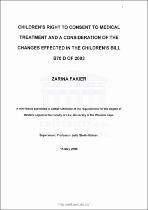
Children's right to consent to medical treatment and a consideration of the changes effected in the Children's Bill B70 D of 2003
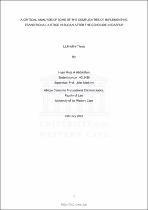
A critical analysis of some of the complexities of implementing transitional justice in Sudan after the genocide in Darfur
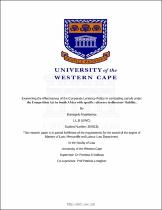
Examining the effectiveness of the Corporate Leniency Policy in combating cartels under the Competition Act in South Africa with specific reference to directors’ liability.
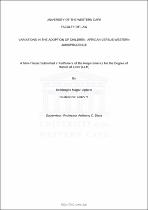
Variations in the adoption of children: African versus Western Jurisprudence

The role of international law in juvenile justice Reform in south africa
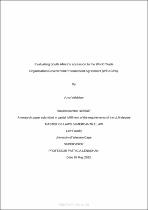
Evaluating South Africa’s accession to the World Trade Organisation Government Procurement Agreement (WTO GPA).
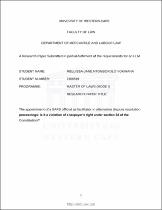
The appointment of a SARS official as facilitator in alternative dispute resolution proceedings: is it a violation of a taxpayer’s right under section 34 of the Constitution?
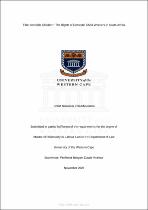
Invisible children: the rights of domestic child workers in South Africa
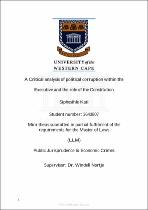
A critical analysis of political corruption within the executive and the role of the constitution
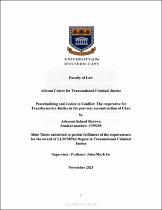
Peacebuilding and justice in conflict: the imperative for transformative justice in the post-war reconstruction of Chad
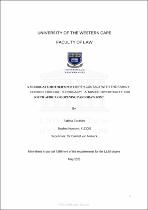
A surrogate mother’s post-birth contact with the family formed through surrogacy: a missed opportunity for South Africa or opening pandora’s box?
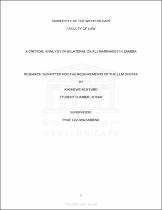
A critical analysis of bilateral (dual) marriages in Zambia
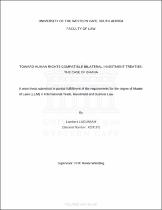
Toward human rights-compatible bilateral investment treaties: the case of Ghana
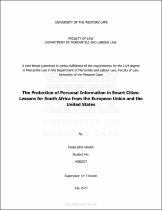
The protection of personal information in smart cities: lessons for South Africa from the European union and the United States

Inadequate representation of female attorneys in the legal profession in South Africa

Muslim family law and judicial protection of women’s rights in Kenya: an assessment
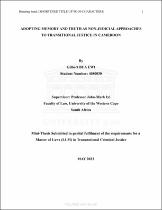
Adopting memory and truth as non-judicial approaches to transitional justice in Cameroon

ECOWAS court’s jurisdiction and the argument of sovereignty: an evaluation of an impeachment Debacle in Liberia
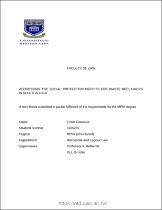
Addressing the social protection deficits for waste declaimer’s in South Africa
Articles on South African law
Displaying 1 - 20 of 136 articles.

It took 16 years but South Africa has impeached a senior judge – who is John Hlophe and what went wrong?
Narnia Bohler-Muller , Human Sciences Research Council

South African marriage ruling is a win for divorcees and surviving spouses: it guides the sharing of their assets
Waheeda Amien , University of Cape Town

South African politicians vs judges: new book defends the constitution
Anthony Diala , University of the Western Cape

South Africa’s surveillance law is changing but citizens’ privacy is still at risk
Jane Duncan , University of Glasgow

The family home in South African townships is contested – why occupation, inheritance and history are clashing with laws
Maxim Bolt , University of Oxford

Corruption in South Africa: would paying whistleblowers help?
Johandri Wright , University of the Western Cape


Suspension of two South African judges has opened up debates about bad working conditions and poor delivery of justice

Zuma prison case casts doubt on South Africa’s medical parole law
Chesne Albertus , University of the Western Cape

Justice Yvonne Mokgoro: South Africa’s trailblazing defender of justice, human dignity and the constitution
Omphemetse Sibanda , University of Limpopo
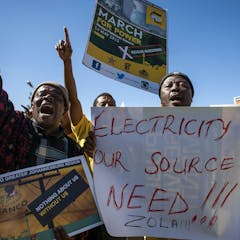
Power cuts: South Africa’s state of disaster is being contested in court - COVID rulings give clues as to the outcome
Tracy-Lynn Field , University of the Witwatersrand

Weed in South Africa: apartheid waged a war on drugs that still has unequal effects today
Thembisa Waetjen , University of Johannesburg
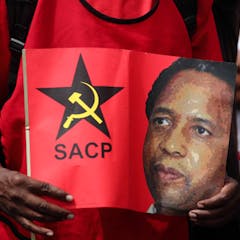
Janusz Walus parole: South Africa’s constitutional court was right - but failed the sensitivity test
Sascha-Dominik (Dov) Bachmann , University of Canberra

Janusz Walus and parole for prisoners serving life sentences in South Africa: the weaknesses of the court’s decision
Jamil Mujuzi , University of the Western Cape
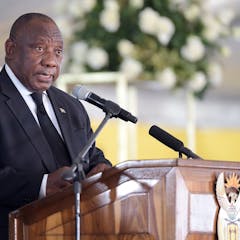
How to impeach a president: Ramaphosa case puts new rules to the test in South Africa
Richard Calland , University of Cape Town

Multiparty democracy is in trouble in South Africa – collapsing coalitions are a sure sign
Susan Booysen , University of the Witwatersrand

Legal sex work in South Africa won’t create new problems, just help solve old ones
Rinda Botha , University of the Free State

Religion and state need to be in balance to protect democracy in South Africa
Dion Forster , Stellenbosch University

Justice Maya’s support for African languages in South Africa’s courts is a positive sign
Zakeera Docrat , University of the Western Cape and Russell H. Kaschula , University of the Western Cape

South Africa has a new Chief Justice: an introduction to Raymond Zondo

What the Zulu kingship judgment tells us about the future of South African customary law
Related topics.
- Constitutional Court
- Cyril Ramaphosa
- Peacebuilding
- Rule of law
- Social justice
- South African constitution
- South African politics
- State capture

School of Social Sciences – Public Policy and International Relations opportunities

Partner, Senior Talent Acquisition

Deputy Editor - Technology

Sydney Horizon Educators (Identified)

Deputy Vice-Chancellor (Academic and Student Life)
Top contributors.
Associate Professor in Public Law, University of Cape Town
Professor Emeritus of Public Law, University of Cape Town
Professor of Law, New York Law School
Postdoctoral fellow, University of Cape Town
Professor of Legal Pluralism, Religious Family Laws, and Human Rights, University of Cape Town
Professor of Sociology, University of the Witwatersrand
Professor of Public Affairs, Tshwane University of Technology
Claude Leon Foundation Chair in Constitutional Governance, University of Cape Town
Professor in Political Science, University of South Africa
Associate Professor, Sociology, University of Fort Hare
Executive Dean and Full Professor, Faculty of Management and Law, University of Limpopo
Professor of Digital Society, University of Glasgow
Assistant Professor, School for Global Inclusion and Social Development, UMass Boston
Professor of Political Studies, University of Johannesburg
- X (Twitter)
- Unfollow topic Follow topic

Library electronic resources outage May 29th and 30th
Between 9:00 PM EST on Saturday, May 29th and 9:00 PM EST on Sunday, May 30th users will not be able to access resources through the Law Library’s Catalog, the Law Library’s Database List, the Law Library’s Frequently Used Databases List, or the Law Library’s Research Guides. Users can still access databases that require an individual user account (ex. Westlaw, LexisNexis, and Bloomberg Law), or databases listed on the Main Library’s A-Z Database List.
- Georgetown Law Library
- Foreign & International Law
South African Legal Research
Introduction.
- Secondary Sources: Treatises & Books
- Secondary Sources: Journal Articles
- Constitution
- Statutes & Codes
- Court Decisions
- Truth and Reconciliation Commission
- Government Resources
- Citations to South African Law
- Other Research Guides & Update History
Key to Icons
- Georgetown only
- On Bloomberg
- More Info (hover)
- Preeminent Treatise
South Africa is a multiracial, multilingual parliamentary republic comprised of nine provinces. Since the end of apartheid and the transition to majority rule in 1994, it has undergone significant changes, including the introduction of a new constitution, bill of rights, and constitutional court. Although South Africa is a unitary state, its provincial governments enjoy a limited degree of autonomy. South Africa's uniquely hybrid legal system is a legacy of successive waves of colonial settlement. A foundation of Roman-Dutch law principles, introduced by the Dutch East India Company prior to the modern era of civil law codification, has evolved under the influence of English common law procedures and precedents. A parallel system of African customary law operates alongside the European system, and is particularly salient in the fields of family law, property, and inheritance.
The Georgetown Law Library's print collection of South African legal materials is located on the fourth floor of the Williams Library. All of these materials have call numbers beginning with the letters KTL.
Key Resources for South African Legal Research
Free resource.
- Southern African Legal Information Institute (SAFLII) This free resource provides access to both national and provincial legislation and case law , as well as articles published in selected South African law journals . All content can be browsed chronologically by year of enactment (legislation), year of decision (case law) or year of publication (articles) . It is also possible to search by keyword. For greater precision, use the Advanced Search form. Select the type of search from the "Find" column. Use the database menu on the right to limit the search to a particular type of content.
South African Content for U.S. Academic Subscribers to Lexis
- Butterworth's South African Constitutional Law Reports This reporter selectively publishes judicial decisions that interpret South Africa's post-apartheid constitution. Most decisions are in English, but some are in Afrikaans. It also publishes key constitutional law decisions from neighboring jurisdictions, including Botswana, Namibia, and Zimbabwe. Coverage is from 1991-present.
- Butterworth's Statutes of South Africa This compilation includes all statutes enacted at the national level that were in force at the time of publication (July, 2014). It has not been updated. Consult SAFLII for statutes enacted or revised subsequent to July of 2014.
Practical Guidance & Commentary on South African Law
- Getting the Deal Through (GTDT) GTDT offers practitioner-written summaries of South African law governing selected practice areas ("work areas"). Each summary follows a question and answer format and includes references or citations to primary legal materials. Begin by selecting South Africa as the jurisdiction from the menu at the center of the page. Then select the desired work area (practice area).
- Thomson Reuters Practical Law - South Africa U.S. academic subscribers to Westlaw may access this online resource, which provides practitioner-written guidance on South African law for select practice areas. Content includes practice notes, checklists, and tool kits, plus standardized forms and document templates.
- Global Legal Monitor - South Africa (Law Library of Congress) This free resource provides analysis and commentary on significant developments in South African law, including the enactment of important new legislation and the issuance of landmark judicial decisions. Links to primary sources are almost always provided. Use the filters on the left to narrow by date and by topic.
Research Assistance
If you need assistance with South African legal research, visit the Research Help page of the Georgetown University Law Library's website. Or contact the Law Library's International and Foreign Law Department by phone (202-662-4195) or by email ( [email protected] ). Georgetown Law Center students may schedule a one-on-one research consultation with a librarian.
South African Flag

Public domain image via Wikimedia Commons .
Need Help? Contact the Georgetown Law Library's International and Foreign Law Department.
International & foreign legal research (202) 662-4195 request a research consultation , the nine provinces of south africa.

Image by Mart Bouter via Wikimedia Commons (Creative Commons Attribution-Share Alike 4.0 international license).
Update History
Revision in progress 05/21 (chb) Revised 11/13 (mms)
- Next: Secondary Sources: Treatises & Books >>
- © Georgetown University Law Library. These guides may be used for educational purposes, as long as proper credit is given. These guides may not be sold. Any comments, suggestions, or requests to republish or adapt a guide should be submitted using the Research Guides Comments form . Proper credit includes the statement: Written by, or adapted from, Georgetown Law Library (current as of .....).
- Last Updated: Mar 8, 2023 3:02 PM
- URL: https://guides.ll.georgetown.edu/southafricanlegalresearch
South Africa: Private Law In 2024: Family Law And Personal Rights

In a clear sign that South Africa's constitutional democracy is maturing, laws relating to family law and personal rights were easily the most challenged regulations in the highest courts in the land in 2023. Naturally, the judgments have a bearing on how we consider aspects of maintenance, childrens' rights and marriage. Barnard's Family Law team has identified two specific legal areas that may affect the firm's clients in 2024 and should therefore be reviewed or addressed.
Maintenance
Many divorced parents have a settlement agreement and/or maintenance order wherein their maintenance payments are regulated. An important specification in the maintenance clause would be the escalation of the maintenance amount – including determining when such an escalation must take place as well as the percentage of the escalation. We recommend revisiting your maintenance order and/or maintenance clause to determine when the maintenance amount will escalate and plan accordingly.
If your maintenance order does not include a provision for the escalation of the maintenance amount, it might be valuable to visit Barnard's Family Law team to discuss whether an escalation in maintenance is necessary. The maintenance Court can be approached with an application to revise the maintenance agreement.
At the beginning of every new year, it is important – when you have children as part of a divorce or separation – to ensure that your annual contact schedule with your child's other parent (or your co-parent) is planned in advance. It might be valuable to have a meeting with the co-parent to discuss the care and contact schedule of the year.
It is also important to be aware of any planned school tours, camps etc. These logistical arrangements need to be made in advance with the co-parent, to ensure that when the time comes the payments etc are not in dispute. Certain school tours also require specific written permission from both parents.
The Children's Court
In an exciting development for family law, the jurisdiction of Children's Courts was expanded at the end of 2023. Children's Courts have been granted the jurisdiction to adjudicate over guardianship disputes. Therefore, people who do not necessarily have the financial means to approach a High Court with a guardianship dispute can now approach their nearest Children's Court for assistance.
GETTING MARRIED?
Ante-nuptial agreements
The beginning of a new year is normally 'high season' for romantic proposals and wedding planning. However, you must remember to ensure that your ante-nuptial agreement is in order, timeously, before you say, "I do."
To be married out of community of property, the parties have to sign an antenuptial contract prior to the commencement of the marriage. An ante-nuptial contract must be signed in the presence of a notary and thereafter registered in the deeds office.
The content of this article is intended to provide a general guide to the subject matter. Specialist advice should be sought about your specific circumstances.
© Mondaq® Ltd 1994 - 2024. All Rights Reserved .
Login to Mondaq.com
Password Passwords are Case Sensitive
Forgot your password?
Why Register with Mondaq
Free, unlimited access to more than half a million articles (one-article limit removed) from the diverse perspectives of 5,000 leading law, accountancy and advisory firms
Articles tailored to your interests and optional alerts about important changes
Receive priority invitations to relevant webinars and events
You’ll only need to do it once, and readership information is just for authors and is never sold to third parties.
Your Organisation
We need this to enable us to match you with other users from the same organisation. It is also part of the information that we share to our content providers ("Contributors") who contribute Content for free for your use.


Law Society of South Africa
- Android App
- Classifieds – December 2023
- Classifieds – November 2023
- Classifieds – October 2023
- Classifieds – September 2023
- Classifieds – August 2023
- Classifieds – July 2023
- Classifieds – June 2023
- Classifieds – May 2023
- Classifieds – April 2023
- Classifieds – March 2023
- Classifieds – January/February 2023
- Classifieds – December 2022
- Classifieds – November 2022
- Classifieds – October 2022
- Classifieds – September 2022
- Classifieds – August 2022
- Classifieds – July 2022
- Classifieds – June 2022
- Classifieds – May 2022
- Classifieds – April 2022
- Classifieds – March 2022
- Classifieds – January/February 2022
- Classifieds – December 2021
- Classifieds – November 2021
- Classifieds – October 2021
- Classifieds – September 2021
- Classifieds – August 2021
- Classifieds – July 2021
- Classifieds – June 2021
- Classifieds – May 2021
- Classifieds – April 2021
- Classifieds – March 2021
- Classifieds – January/February 2021
- Classifieds – December 2020
- Classifieds – November 2020
- Classifieds – October 2020
- Classifieds – September 2020
- Classifieds – August 2020
- Classifieds – July 2020
- Classifieds – June 2020
- Classifieds – May 2020
- Classifieds – April 2020
- Classifieds – March 2020
- Classifieds – January/February 2020
- Classifieds – December 2019
- Classifieds – November 2019
- Classifieds – October 2019
- Classifieds – September 2019
- Classifieds – August 2019
- Classifieds – July 2019
- Classifieds – June 2019
- Classifieds – May 2019
- Classifieds PDF – April 2019
- Classifieds – March 2019
- Classifieds PDF – January/February 2019
- Classifieds – December 2018
- Classifieds – November 2018
- Classifieds – October 2018
- Classifieds – September 2018
- Classifieds – August 2017
- Classifieds – July 2018
- Classifieds – June 2018
- Classifieds – May 2018
- Classifieds – April 2018
- Classifieds – March 2018
- Classifieds – January/February 2018
- Archive 2017
- Archive 2016
- Archive 2015
- Archive 2014
- Archive 2013
- Archive 2012
- Admissions – August 2017
- Admissions – March 2017
- Admissions – August 2016
- Admissions – March 2016
- Admissions – July 2015
- Admissions – January/February 2015
- Admissions – July 2014
- Admissions – December 2013
- Admissions – July 2013
- Admissions – January/February 2013
- Admissions – July 2012
- Seen on social media
- People & Practices
- Practice Management
- Practice Notes
- Feature Articles
- Law Reports
- New Legislation
- Employment Law
- Recent Articles and Research
- Books for lawyers
- Classifieds
- Classifieds PDF
- Classifieds – March 2024
- De Rebus PDF download
- Candidate CVs

Persons and family law

Safeguarding rights in matrimonial regimes: Addressing constitutional concerns in the Trust Property Control Act
By Marietjie du Toit The trust legal institution, as it is recognised today – was unknown in Roman-Dutch law, although the principle of fiduciary duties has been a universal phenomenon […]

A discussion on the legal position of adult dependent children
The Supreme Court of Appeal (SCA) on 21 July 2022 in a unanimous decision of Z v Z 2022 (5) SA 451 (SCA) dispelled the notion that mothers cannot apply […]

Unfair discrimination of ‘older person’ definition found in the Older Persons Act
The Constitution is the supreme law, and it provides protection to all those lives within the Republic (s 7 of the Constitution). Chapter 2 of the Constitution contains the Bill […]

Exploring the availability of s 7(3) redistribution to spouses in foreign marriages
By Kobus Brits Section 7(3) of the Divorce Act 70 of 1979 states as follows: ‘A court granting a decree of divorce in respect of a marriage out of community […]

Is mediation an option in sexual violence cases?
‘Sexual [assault] cases are similar in power structure to domestic violence or criminal assault matters. In those cases there is more than a simple dispute over money or property. Instead, […]

Alter ego trusts: How do courts determine the concealment of assets through trusts in divorce cases?
This article discusses the approach adopted by South African courts when deciding whether it is legally permissible to consider the value of trust assets when determining the value of the […]

Enhancing effectiveness: Strengthening protection for domestic violence victims through the Amendment Act
‘In 2020, President Cyril Ramaphosa declared [gender-based violence (GBV)] South Africa’s second pandemic and noted that it needed to be taken as seriously as the coronavirus. Already named the “rape […]

Substantial misconduct as a factor to grant forfeiture of patrimonial benefits of a marriage
M v M (SCA) (unreported case no 022/2022, 26-5-2023) (Mbatha JA (Molemela, Meyer and Matojane JJA and Siwendu AJA concurring)) In terms of s 9 of the Divorce Act 70 […]

Husband ordered to pay maintenance of stepchild while divorce is pending as he is the administrator of the joint estate
GR v RR (GP) (unreported case no 38304/21, 21-2-2023) (Noko AJ) In GR v RR the Gauteng Division of the High Court ordered that pending a divorce, the respondent continue […]

Eliminating sexual harassment in the workplace – #TimesUp for employers
By Mmathabiso Khalema Holmes JA in S v Snyman 1968 (2) SA 582 (A) likened complainants in sexual assault cases to accomplices in crime and described them as having a […]

De Rebus : The legal practitioner’s educational journal March 1st, 2024

Unpacking the business rescue procedure: The importance of a cost-effective solution March 1st, 2024
- Regulation of crypto assets in South Africa: Challenges and opportunities March 1st, 2024
- Master’s office saga: End in sight February 1st, 2024
Latest Issue
Letters to the Editor – March 2024 March 1st, 2024

BRICS Legal Forum welcomes the inclusion of new states as proposed by the BRICS Summit 2023 March 1st, 2024
- Pretoria Attorneys Association Conference on Consolidated Practice Directive 1 of 2024 March 1st, 2024
- Cyber breaches: Human element remains by far the biggest vulnerability March 1st, 2024
- Due care and cyber security prevention practices March 1st, 2024
- Res ipsa loquitur as a legal maxim in motor vehicle accidents March 1st, 2024
- Road Accident Fund regulations reviewed and set aside March 1st, 2024
- Confidentiality and privacy in arbitration proceedings March 1st, 2024
- The transition from the Johannesburg Interbank Average Rate to the South African Rand Overnight Index Average: An update on the legal journey March 1st, 2024
- The Law Reports – March 2024 March 1st, 2024
- The duty to account – a trustee’s duty towards the trust March 1st, 2024
- Invalidating contracts for procurement based on s 217 of the Constitution March 1st, 2024
- Restorative justice should not be used to influence the sentencing when serious crimes are committed March 1st, 2024
- Legal practitioners do not only owe a duty to their clients, but they also owe a duty to the courts and the legal system March 1st, 2024
- New legislation – March 2024 March 1st, 2024
- Employment law update – Automatically unfair dismissal in the case of a protected disclosure March 1st, 2024
- Recent articles and research – March 2024 March 1st, 2024
- Ethics: A losing battle against national and global storms March 1st, 2024
- The costs order remedy in terms of s 342A(3) of the Criminal Procedure Act and the need for it to come into effect March 1st, 2024
Your Practice
- Give us your feedback
- Resources and documents
- Cyber Insurance
- CV portal for candidate legal practitioners
- Subscribe to De Rebus
- Guidelines to submit articles
- Submit an article
- De Rebus education diary
- Opening and Operating an Attorney Law Practice in South Africa
- Closing an Attorney Law Practice in South Africa

De Rebus proudly displays the “FAIR” stamp of the Press Council of South Africa, indicating our commitment to adhere to the Code of Ethics for Print and online media, which prescribes that our reportage is truthful, accurate and fair. Should you wish to lodge a complaint about our news coverage, please lodge a complaint on the Press Council’s website at www.presscouncil.org.za or e-mail the complaint to [email protected] . Contact the Press Council at (011) 4843612.
- Browse Law Schools
- LLM Articles
- LLM Info Events
- Law School Rankings
- Top 10 Lists
- LLM Scholarships
- LLM Discussions
- Application Tracker
- Advanced LLM Search
- UK / Ireland
- Australia / New Zealand
- Canada & Latin America
- Africa / Middle East
By Concentration
- General LL.M. Programs
- Alternative Dispute Resolution / Arbitration / Mediation
- American Law / U.S. Law
- Banking Law / Finance Law / Securities Law
- Business Law / Commercial Law
- Corporate Law / Company Law
- Human Rights
All Resources
- South Africa
- Concentrations
- Family Law / Child Law
LLM Programs in Family Law / Child Law - South Africa
1-5 of 5 results sorted by featured popularity name city
Full-Time: Master of Laws (LL.M.) in Banking Law, Master of Laws (LL.M.) in Corporate Law, Master of Laws (LL.M.) in Criminal Law and Criminal Procedur... more…
By Research: Master of Laws (Full Dissertation) Constitutional and International Law, Master of Laws (Full Dissertation) Jurisprudence, Master of Laws (F... more…
Full-Time: LL.M., LL.M. in Banking Law, LL.M. in Child Law, LL.M. in Constitutional and Administrative Law, LL.M. in Consumer Protection Law more…
Part-Time: LL.M. in Sexual and Reproductive Rights in Africa more…
By Research: MPhil in Extractive Industry Policy, Management and Regulation, MPhil in Medical Law and Ethics more…
Full-Time: LL.M. in Advanced Criminal Justice, LL.M. in Business Law, LL.M. in Child Care and Protection Law, LL.M. in Constitutional Litigation, LL.M.... more…
Part-Time: LL.M. in Environmental Law more…
Full-Time: LL.M. in Human Rights & Democratisation in Africa, LL.M. in International Trade & Investment Law in Africa, LL.M. in Multidisciplinary Human... more…
News - LLM in South Africa

Boost your U.S. LLM application with personalized tips
Nov 28, 2023
More LLM News
Articles - LLM in South Africa

Mastering Conflict: LL.M. Programs in Alternative Dispute Resolution
Fulfilling career paths await graduates of negotiation, dispute resolution, and arbitration LL.M. programs, where making a meaningful impact on society is paramount

Beyond Dollars: Unlocking the Full Value of an LL.M. Degree
The legal job market slowdown has sharpened focus on the expected payoff

Lights, Camera, Action: LL.M. Programs in Media and Entertainment Law
With a focus on interdisciplinary collaboration, hands-on learning, and industry-aligned instruction, these LL.M. programs draw those with a passion for both law and the arts
More Articles
- Applications Jan 09, 2024 147 0
- UK LLM Qualifying Degree -> Qualify as Lawyer in Ghana? Jun 26, 2023 224 2
- Credit for LLM after LLM and PhD Law Jun 28, 2022 907 2
- Natural Resources law's Sep 11, 2019 434 0
- Nigerian qualified lawyer looking to do the post call course in Ghana Sep 09, 2019 1,417 3
- Available Scholarship for African countries Aug 15, 2019 1,306 2
- Obtain a visa Jan 25, 2019 544 1
- LLB accreditation after 3 year BA in Human Resource Management? Feb 12, 2018 1,136 3
- Qualify in Ghana (from civil law country) Feb 11, 2018 1,087 1
- Question LLM Africa/Middle East Jan 12, 2018 951 4

More Top Lists
- Terms of Use
- Cookie Policy
- Privacy Policy
Information
- Featured LLM Programs
- MBA Programs
- Online MBA Programs
- Executive Courses
Search LLM Programs
Go to Advanced Search
Subscribe to the LLM GUIDE Newsletter
Receive the latest news and tips
© 2001–2024 Pritzwalks – LLM GUIDE – Master of Laws (LL.M.) Programs Worldwide

IMAGES
VIDEO
COMMENTS
An exhaustive overview and analysis of developments in South African Family Law, covering the period from July 2019 to June 2020. ... Discover the world's research. 25+ million members; 160 ...
Women and Law, and Feminist Jurisprudence Family Law Children's Law International Human Rights Law, particularly that based on the ICESCR (economic, social, and cultural rights) or the Women's Convention. On sabbatical. Ms. Baase, M. m [email protected]. Rm 4.15, Kramer Law Building +27 21 650 7039. Child Law; Customary Law; South African ...
Family Laws and Regulations South Africa 2024. ICLG - Family Laws and Regulations - South Africa Chapter covers common issues in family law - including: jurisdiction, divorce, cohabitation, children, abduction, relocations, cross-border issues, parental responsibility, child maintenance and marital agreements.
22. Wildenboer L, Ms South African Legal History 7. Department of Mercantile Law Name Research Focus Areas 1. Mr K Bapela Tax law, Labour Law and Commercial Law 2. Prof Mildred Bekink Company Law, Commercial Law, Insolvency Law, Child and Family Law 3. Prof R Cassim Company Law, Corporate Governance 4.
Family law or matrimonial law incorporates family matters and domestic relationships such as marriage and civil unions, divorce and annulment, child custody and the best interests of the child, maintenance, child abuse and domestic violence. Civil Union Act 17 of 2006. Children's Act 38 of 2005. Divorce Act 70 of 1979. Domestic Partnership Bill.
HOT TOPICS IN FAMILY LAW IN AFRICA A virtual meeting presented by The International Academy of Family Lawyers (IAFL) ... (South Africa), Oba Nsugbe QC SAN (Nigeria and England) and Florida Kabasinga (Rwanda) 14:45- 15:30 Networking breakouts 15:30-15:45 Summary and farewell Friday 5 February, 2021
Yonatan T. Fessha is Professor of Law and Research Chair in constitutional design in divided societies at the University of the Western Cape. ... Religious, Personal and Family Law Systems in South Africa, in Rautenbach C. (ed.) Introduction to Legal Pluralism in South Africa 5th Edition, pp. 61-76 (LexisNexis, 2018) ... Muneer 'The Impact of ...
The purpose of this paper is to document the status quo as far as family ideology and family law in South Africa is concerned. The emphasis will. on uncovering the particular conception of the family which informs family law at present. Possible future changes to the law are also addressed. 2.
Accessibility of maintenance in terms of the Maintenance of Surviving Spouses Act 22 of 1990. Anderson, Marcus Anthony (University of Pretoria, 2019) It is surmised that the Maintenance of Surviving Spouses Act 27 of 1990 can be classified as a very profound, yet acceptable limitation on a married person's right to freedom of testation.
Are you interested in pursuing a research degree in law at the University of South Africa? If so, you should check out this pdf document that outlines the research focus areas of the College of Law for 2022. You will find information on the admission requirements, the application process, the research topics and the supervisors available in each department. Whether you want to explore ...
In this blog post, we will explore some compelling dissertation topics in South African family law, and provide insights into their significance and potential impact. 1. The Impact of Customary Law on Family Structures. South Africa is a country with a rich and diverse cultural landscape, and customary law plays a significant role in shaping ...
South African family law is concerned with those legal rules in South Africa which pertain to familial relationships. It may be defined as "that subdivision of material private law which researches, describes and regulates the origin, contents and dissolution of all legal relationships between: (i) husband and wife (including the parties to a civil union); (ii) parents, guardians (and other ...
The South African common-law delict is explored ... The deception provisions of sections 10(12) and 10(13) ... In this research the dissolution of the universal partnership is viewed through multiple lenses from ancient Roman law to modern insolvency and customary law. ... Family (3) Guardianship (3) Maintenance (3) National Credit Act 34 of ...
Practical Guidance: Family Law. Practical Guidance Family Law covers the essential information and easy-to-use resources needed to effectively deal with family law matters in South Africa. Users have access to practical aids and detailed guidance on processes involved in every step of the marital relationship from selecting a matrimonial regime ...
In general, family law salaries in South Africa can range from as low as R100,000 to as high as R1,200,000 or more per year. The salary of a family law attorney can be influenced by several ...
Research publications are accessible in the Research Repository. ... During the colonial era, South Africa's indigenous normative order was subjugated by European laws, which led to a distortion of indigenous laws and the perception that Western jurisprudence was the supreme law. ... Muslim family law and judicial protection of women's rights ...
South African marriage ruling is a win for divorcees and surviving spouses: it guides the sharing of their assets. Waheeda Amien, University of Cape Town. The judgment will also benefit spouses in ...
If you need assistance with South African legal research, visit the Research Help page of the Georgetown University Law Library's website. Or contact the Law Library's International and Foreign Law Department by phone (202-662-4195) or by email ( [email protected] ). Georgetown Law Center students may schedule a one-on-one research ...
Private Law In 2024: Family Law And Personal Rights. In a clear sign that South Africa's constitutional democracy is maturing, laws relating to family law and personal rights were easily the most challenged regulations in the highest courts in the land in 2023. Naturally, the judgments have a bearing on how we consider aspects of maintenance ...
Research Paper Topics final year llb research paper topics dr booley discuss the reliance theory protection as the basis of contractual liability in the law of ... law reform processes underway to consider amendments to [South Africa's] marriage laws. One is managed by the South African Law Reform Commission [PROJECT 144 SINGLE MARRIAGE ...
The transition from the Johannesburg Interbank Average Rate to the South African Rand Overnight Index Average: An update on the legal journey March 1st, 2024; The Law Reports - March 2024 March 1st, 2024; The duty to account - a trustee's duty towards the trust March 1st, 2024; Invalidating contracts for procurement based on s 217 of the ...
Nov 28, 2023. The "Application Nuts and Bolts" online event will take place December 1. EducationUSA LL.M. Tour Touches Down in Europe and Turkey Oct 24, 2023. Introducing the 2023-2024 LLM GUIDE Student Bloggers Oct 04, 2023. Get Tips and Advice for Your LL.M. Application at Free Virtual Workshops Sep 08, 2023.
In South Africa, employees have a constitutional right to strike. Section 23 of the Constitution of the Republic of South Africa, 1996, provides all workers with labour rights including the right to strike. The right to strike is given effect to in chapter IV of the Labour Relations Act 66 of 1995 (hereinafter referred to as the LRA).